EMBRACING DIVERSITY
Supporting the LGBTQ+ community

Older people’s voices
Campaigning for change
Supportive workplaces
Carer’s Leave Act essentials
The future workforce
Engaging young people
Digitising social care
Simplifying the journey
JULY 2024 www.caremanagementmatters.co.uk







Care Choices Ltd 3, Valley Court Offices, Lower Rd, Croydon, Nr Royston, SG8 0HF (01223) 207770 www.carechoices.co.uk Care Information Search for Care Blog Publications Useful Contacts Contact Us Details Features Care Choices is the reliable place to find the care that’s best for you and the information you need. Whether you’re looking for a care home or ideas on staying independent at home, this website has been designed to make it easy for you. ENHANCE YOUR PROFILE TODAY www.carechoices.co.uk 01223 206967 І paul.ocallaghan@carechoices.co.uk * Minimum booking period is 1 year. Price excludes VAT. For full details of opportunities to promote your service on the website, contact us. Promote your service to care seekers for as little as £5.76 per week*
Social Care Insights
Richard Humphries explores the likelihood of social care forming part of the political discourse in the run up to the 2024 general election.
Inside CQC
Amanda Partington-Todd explores innovation occurring across the sector and outlines the regulator’s commitment to driving improvement.
CMM News
Into Perspective
Two founding organisations of the My Vote, My Voice campaign discuss its aims ahead of the general election and the barriers autistic people and people with a learning disability face.
Celebrating Excellence
CMM learns more about ‘Phil the Gardener’, winner of the Compassion Award at the 2024 Markel 3rd Sector Care Awards.
Event Review
ARC England members recently came together with the wider learning disability community to celebrate creativity in learning disability and autism support services.
What’s On?
Straight Talk
Helen Cook leads a partnership calling for urgent reform to the homecare system against the backdrop of the general election.


In this issue



Embracing diversity: LGBTQ+ and Trans awareness training
Mike Todrovich highlights best practice guidance for providers to promote inclusivity, recalling his own experiences of supporting the LGBTQ+ community.
The campaign to give older people a voice: Support is growing
Dr Carole Easton OBE renews the call for a Commissioner for Older People and Ageing in England, reflecting on the year following the campaign’s launch.
The Carer’s Leave Act 2023:
Creating a more supportive workplace
Robyn Ackerman provides essential guidance for care sector employers getting to grips with the new legislation.
Time to change? Engaging the next generation of care workers
Could the youth of today help to secure the future of the adult social care workforce? Not as it stands, says Simon Bottery, who shares findings from an ongoing programme of work.
The next steps in digitising social care: Simplifying the journey
Liz Jones reflects on the essential talking points from the latest episode of CMM OFF THE PAGE, which unpacked the topic of digitisation in social care.
CMM July 2024 3
REGULARS FEATURES 05 07 09 30 46 48 49 50
41 37 20 25 32 37 41 20 32 25
EDITORIAL
editor@caremanagementmatters.co.uk
Lead Editor: Henry Thornton
Content Editors: Aislinn Thompson, Melissa Rumbold, Bethany Crow
PRODUCTION
Designer: Rebecca Mendil
Director: Lisa Werthmann
Studio Manager: Jamie Harvey
ADVERTISING
sales@caremanagementmatters.co.uk 01223 207770
Advertising Manager: Aaron Barber aaron.barber@carechoices.co.uk
Director of Sales: David Werthmann david.werthmann@carechoices.co.uk
SUBSCRIPTIONS
Sign up to receive the latest magazines and news for FREE. info@caremanagementmatters.co.uk 01223 207770 www.caremanagementmatters.co.uk
Care Management Matters is published by Care Choices Ltd who cannot be held responsible for views expressed by contributors. Care Management Matters © Care Choices Ltd 2024 CCL REF NO: CMM 21.5

CMM magazine is officially part of the membership entitlement of:

CONTRIBUTORS
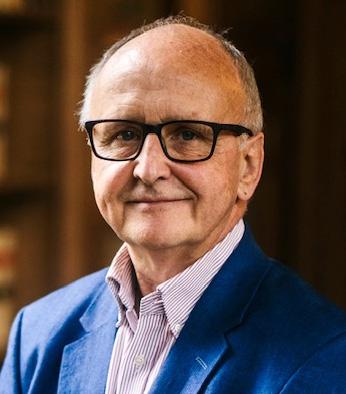
Richard Humphries Senior Policy Advisor, Health Foundation

Robyn Ackerman Solicitor, Employment and Corporate Law, Gordons Partnership Solicitors
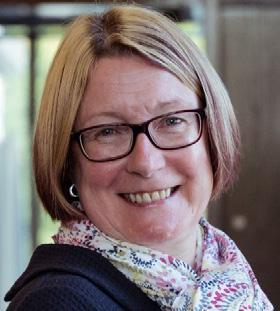
Liz Jones Policy Director, National Care Forum (NCF) @NCFCareForum

Partington-Todd Deputy Director of Adult Social Care, Care Quality Commission (CQC)

@CQCProf Mike Todrovich Communications and Compliance Manager, Antler Care and Recruitment

OBE
Chief Executive, Centre for Ageing Better @Ageing_Better
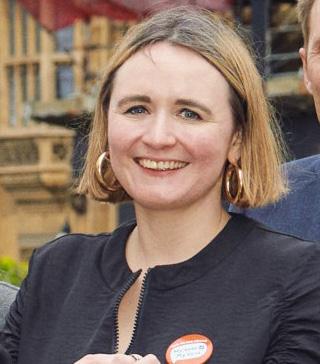
@MarkBrookes66 @ali__gunn
Gunn Head of Public Affairs and Policy, United Response

MBE Advocacy Lead, Dimensions

Amanda Weinberg Copywriter, Nightingale Hammerson @NGHHammerson

Senior Fellow, Social Care at The King’s Fund @blimeysimon

Cook Managing Director, Personal Care Specialists
4 CMM July 2024
Helen
@RichardnotatKF
Dr Mark Brookes
Ali
@CQCProf
Simon Bottery
Dr Carole Easton
Amanda
SOCIAL CARE INSIGHTS
From Richard Humphries
Richard Humphries, Senior Policy Advisor to the Health Foundation, explores the likelihood of social care forming part of the political discourse in the run up to the 2024 general election, drawing on past experience and hopes for the sector’s future.
If the opinion polls are correct, we will wake up on 5th July with a new Government. So, it is no wonder that many social care leaders are clamouring for political parties to say what they will do about a system that has been beset by over a decade of austerity, with its weaknesses exposed by COVID-19 and a deepening dislocation between people’s needs and aspirations and the capacity of the current system to deliver them.
"The 2024 general election offers an opportunity to raise the profile of social care, not as a cost or a financial burden, but something we value just as much as the NHS."
Approach with caution
History suggests that all of us championing the cause of social care reform should be careful about what we wish for. Why the caution? The challenges of social care are deep-seated, ranging from workforce, funding, unmet needs and a lack of agreement about its very purpose. Sorting them out will need much more than short-term fixes and will take longer than a single parliament. That means a long-term plan that commands cross-party co-operation, if not consensus.
Yet, general election campaigns by their very nature are adversarial and short term, driven by competing views about what is ‘best for the country’. In the heat of campaigning,
parties disparage their opponent’s ideas irrespective of their merits. The demands of retail politics do not sit well with evidence-based policy.
Weaponisation of social care
In this febrile climate, it is easy for politicians to take advantage of poor public understanding of social care, especially when it comes to how it should be paid for – and by whom. That is why we should be nervous about parties using the election to float new ideas about social care funding. In 2010, that led to the ‘death tax’ row, and triggered the collapse of cross-party talks. Seven years later, tables were turned with the ‘dementia tax’ debacle, seen by many as a key factor in the Conservatives losing its majority.
The weaponisation of social care at election time has an even more insidious and lasting consequence. It embeds the idea in the minds of politicians that it belongs in the ‘too difficult’ box, an electoral liability. It is no wonder that Labour’s ‘bomb-proof’ manifesto is likely to omit any specific pledges about social care funding reform, less they be used against it.
Socio-economic value
So, while the sound of silence may surround social care during the election, the argument is really about the pitfalls of starting the discussion around a negative vocabulary of money, costs, death and taxes. That is not to say an honest debate about how much good care costs and how we pay for it is not important. But the heat and noise of electioneering is the worst time to start it.

A better launchpad would be to recognise the importance of social care to our social and economic infrastructure and that the success of social and demographic change has propelled it towards becoming an essential public service.
It is not unreasonable therefore, to ask political parties to set out their ambition for what a good system of care and support should look like, tempered with a pragmatic realism about the time it will take to achieve and the resources that will be required. Getting social care reform into the Overton window will make it less difficult for Government to avoid the funding issues that must be tackled.
The power of relationships
A final reason for caution is that the words of politicians before an election are far less important than their actions in office. Election manifestos are not the be all and end all when it comes to policy commitments. The 2024 general election offers an opportunity to raise the profile of social care, not as a cost or a financial burden, but something we value just as much as the NHS.
The election of a new Government will almost certainly create momentum for change that has been absent in recent years. Whoever wins power faces a grim inheritance in terms of public finances, but no shortage of ideas for the long-term transformation of social care. The ability of social care leaders to develop constructive and influential relationships with whoever forms the next Government will matter far more than adding to the fury of electioneering that, ultimately, may signify little.

CMM July 2024 5
to the Health Foundation. Email: associates@richardhumphries.co.uk : @RichardnotatKF
Richard Humphries is a Senior Policy Advisor
How can the value of the adult social care sector be made more visible to the public in the run up to the general election? Visit www.caremanagementmatters.co.uk and leave a comment on this article or join the conversation to share your thoughts.
Curious about your compliance status especially with recent CQC changes? Compliance Health Check Try our free QCS Compliance Health Check t: 0333 405 33 33 e: info@qcs.co.uk www.qcs.co.uk TAKE THE TEST TAKE THE TEST
 Amanda Partington-Todd, Deputy Director of
Amanda Partington-Todd, Deputy Director of
Adult
Social Care
at the Care
Quality
Commission (CQC), explores innovation occurring across the sector and outlines the regulator’s commitment to driving improvement.
Improvement and innovation are intrinsically linked and are at the heart of health and social care. Improvement through innovation happens across the sector every day. Often, innovations begin with one person’s observation or idea. Supporting staff and colleagues to follow their professional curiosity and develop innovative thinking can lead to improvement across whole systems.
A success story
One example started with the adult continence team at University Hospitals of Leicester NHS Trusts (UHL). It had noticed an increase in toileting-related inpatient falls and asked the question – would reducing caffeine intake reduce the number of falls? Caffeine has a mild diuretic effect and can increase urinary frequency and urgency. Decaffeinated drinks were offered to patients and early results showed a 30% reduction in the number of falls.
Interested by these findings and recognising that falls are the most common cause of injury-related deaths in people over 75, Care England worked with Sarah Coombes, Continence Nurse Specialist at UHL, to find adult social care providers willing to take part in a care home trial.
Stow Healthcare, a group of eight nursing and residential homes in East Anglia caring for more than 350 residents, was the first to trial serving decaffeinated drinks in its homes. Over the six-month trial, the provider observed a 34.72% reduction in toileting-related falls. It has continued to offer decaffeinated drinks as default, with the option of caffeinated beverages available.
This was a small study, but the researchers have suggested that extending it across the sector could save £85m per year in prevented
INSIDE CQC
falls and hospital admissions – and, of course, reduce the number of people whose lives are impacted by falls.
Evolving expectations
Our assessment framework encourages improvement through innovation and assesses providers through the quality statements. Sitting under the ‘Well-led’ key question, the learning, improvement and innovation quality statement specifically addresses the way that leaders support improvement:
‘We focus on continuous learning, innovation and improvement across our organisation and the local system. We encourage creative ways of delivering equality of experience, outcome and quality of life for people. We actively contribute to safe, effective practice and research.’
This quality statement describes the expectation that health and social care services embrace innovation as a means of improvement. The origins of the decaffeination trial, where curiosity was encouraged and supported, leading to a tangible difference to people’s lives, is a good example of how to evidence that.
Late last year, we published the results of a project we’d been running to understand the experiences of providers and innovators who have considered developing or adopting new ways of working. As well as looking at the work being done to promote innovation, the project, funded by the Regulators’ Pioneer Fund, considered how to lift barriers to innovation.
In addition, this also helps us to fulfil our purpose: To ensure health and social care services provide people with safe, effective, compassionate, high-quality care and encourage care services to improve. It also helps us deliver on our strategic commitments to encourage and champion innovation that benefits people.
Through the project, we found that innovation does not have a one-size-fits-all solution but depends upon a thriving improvement culture. This is a culture where people feel supported to try new things and have the space to reflect on progress and setbacks. Innovations and improvements might be big or small – the key is the impact they have on people.
We look for learning cultures and their impact through our assessment activity and will continue to amplify examples of innovation that improve outcomes for people using health and social care services.
Deputy Director of Adult Social Care at the Care Quality Commission

CMM July 2024 7 For more information about the decaffeination trial discussed in this article, read Issue 3 of Care England’s Savings, Solutions, and Sustainability publication. Visit www.caremanagementmatters.co.uk/care-england-publication-saving-solutions-and-sustainability
providerengagement@cqc.org.uk : @CQCProf
Amanda Partington-Todd,
(CQC). Email:
Amanda Partington-Todd






A Good Food Company for Better Living
With service at the heart of what we do, and great people at the heart of our service.
White Oaks offers a comprehensive culinary experience that goes beyond nutrition and hydration. White Oaks enhances the life experience of residents and homeowners by providing holistic care and giving back control. As care providers, they focus on overall wellbeing, not just food service.
Through in-depth industry experience and resident understanding White Oaks builds tailored menus. To ensure they provide stability in homes, White Oaks focuses on staff training, person-centred care, engagement activities, and long-term partnerships. Backed by Compass Group, they pass on the benefits of global business to their customers. White Oaks aims to enhance the quality of life for residents and positively change perceptions of the care, assisted and retirement living sectors, ensuring that every resident's voice is heard.

Get in touch to find out more. healthcaresales@compass-group.co.uk
www.compass-healthcare.co.uk
Sector response to general election manifestos
Leading voices in the adult social care sector have responded to publication of the manifestos from each of the UK’s main political parties ahead the general election on 4th July. The issues facing the sector and how each of the main parties plans on overcoming them should they form the next Government have been outlined to a varying extent in each manifesto.
In its general election manifesto, the Liberal Democrat party has promised free personal care, a new minimum wage for care workers, a Royal College of Care Workers and an overhaul of the Carers’ Allowance to support unpaid carers.
Independent Care Group (ICG) Chair, Mike Padgham, said, ‘Ed Davey showed great personal understanding and the Liberal Democrats have shown that politicians are listening to our concerns on social care and are prepared to put some very sensible proposals in their manifesto to begin tackling the issues.
‘Where the Liberal Democrats fall short is in being even more bold and going for a true, root and branch reform of social care, which requires the creation of a National Care Service, to bring NHS and social care under one roof and better investment into social care to make that possible.’
Professor Martin Green OBE, Chief Executive at Care England, said, 'There's no shying away from the fact our sector needs substantial investment, and it's reassuring the importance of the social care sector has been recognised the Liberal Democrats.’
To read the Liberal Democrat's general election manifesto in full, visit its website.
In its general election manifesto, the Labour party has promised 'deep reform' including a National Care Service and ‘home first’ care to keep people living independently. It has also promised greater integration with NHS services and fairer pay, terms and conditions to ‘professionalise’ the workforce.
Sam Monaghan, Chief Executive Officer at charity care provider, MHA, said, 'Labour’s manifesto announcement today shows signs that the party has listened to the sector and recognises the need for significant reform. Within the proposed National Care Service programme there is a notable commitment to tackling issues around fair pay, and its workforce plan also includes a strategy for improving training standards and professionalising the sector further.
'However, while there is rhetoric around
consultations and consensus, there is still no concrete outline of how this will be funded or when it will happen.
'Economic growth is the key focus of Labour’s pledge. Yet, despite the obvious economic benefits to be gained from investing in social care – from local employment opportunities to helping people to live at home, independently, for longer – the urgency being felt across the sector for a sustainable, well-funded programme for change has not been fully addressed within the policies outlined.'
To read the Labour party's general election manifesto in full, visit its website.
In its general election manifesto, the Conservative party has stated how it will pursue the existing reforms to implement a £86,000 care cap, which were brought forward by Boris Johnson in 2021 but later delayed until October 2025.
Karolina Gerlich, Chief Executive Officer at The Care Workers' Charity, said, 'It is disappointing that in an 80-page document, care only receives a few lines. The only commitment seems to be a continuation of reforms discussed over the last few years, which have not been nearly enough to support the sector. We are concerned by the impact of benefit changes on people drawing on social care and on care workers, who, as low-paid workers, often need support via benefits themselves. We would like to see clarification on welfare reforms and their impact on working claimants.
'I was surprised to see the NHS along with social care appearing so far down the list of priorities and that the NHS and social care were not mentioned in Prime Minister Rishi Sunak's speech introducing the manifesto.
'We do welcome the multi-year funding settlement, but this depends on how much funding will be provided and over how many years. We would like to see further detailed plans for this. Similarly, while we welcome the 30 hours of childcare, as many care workers with families rely on childcare support, we question the sustainability of this initiative given the current issues with recruitment and retention in the early years sector. Overall, the manifesto is disappointing for adult social care, and we would have liked to see this discussed more comprehensively.'
To read the Conservative party's general election manifesto in full, visit its website.
Belong at Home
A dementia specialist homecare service, Belong at Home, has appointed Emma Gorton to lead its operations as it widens its support to more older people in their homes across Didsbury, Altrincham and south Manchester. Emma has been promoted to head up the team of community support workers based at the Palatine Road care village, Belong Morris Feinmann. The team supports tenants of the village’s independent living apartments, as well as older people living in the wider community.
CrossReach
The General Assembly of the Church of Scotland has appointed Dr Mike Cantlay OBE as Convener of its Social Care Council. Mike will chair the board of CrossReach, one of the largest third-sector providers in Scotland. Mike joined the board in 2020 after years of advocating for the organisation. He has an extensive leadership background, formerly chairing boards across Scotland. Mike will bring a wealth of experience to the role and a commitment to supporting and advancing social care services in Scotland.
Adopt a Grandparent
Mark Beadle has been appointed as an Ambassador for Adopt a Grandparent, which aims to combat loneliness and isolation among older people. Throughout his career, Mark has held multiple leadership roles where he demonstrated his dedication to community wellbeing. In these positions, Mark has enhanced care standards, created significant revenue improvements and achieved operational efficiencies. Adopt a Grandparent won the Making a Difference Award at the Markel 3rd Sector Care Awards 2024.
CMM July 2024 9 NEWS
APPOINTMENTS
Call to pay real Living Wage
The Living Wage Foundation and Citizens UK are calling for the future Government to prioritise paying all adult social care workers in England the real Living Wage, building on the example set in Scotland and Wales.
A new policy paper launched by the Living Wage Foundation, featuring analysis from the Institute for Public Policy Research (IPPR), reveals that over 400,000 adult social care workers in England are currently paid below the real Living Wage, representing 43% of all adult social care workers and 80% in London.
To ensure all adult social care workers are paid the real Living Wage, including the higher London Living Wage for those in the capital, it would cost an estimated £415m. However, this cost would fall to £330m when considering
the uplift cost would be offset by Government recouping additional income tax and national insurance through higher wages. This is less than 2% of the social care budget for the coming year.
According to Skills for Care, for every £1 invested in social care, £1.75 would be generated in the wider economy. In addition, Smith Institute research shows that if a quarter of low-paid workers had their pay increased to the real Living Wage, the UK economy would grow by £1.7bn.
The policy paper outlines that securing at least the real Living Wage for every hour worked including sleep-in shifts and in-work travel time, is a crucial first step in addressing the social care crisis.
Katherine Chapman, Director of the Living Wage Foundation, said, ‘Care workers
play a vital role in society, yet social care remains one of the lowest-paid sectors.
Our policy paper reveals that over 400,000 care workers in England are paid below the real Living Wage. Despite being the backbone of our country, providing essential care to our loved ones when they need it most, many are struggling to make ends meet in insecure, poorly paid jobs that don't cover the cost of living. We must urgently rethink how we value and reward our country's care workers.
‘We would like to see the next Government properly fund social care to ensure that all adult social care workers are paid at least the real Living Wage. Decent pay is a vital first step in addressing the staffing shortfall and building a sustainable social care system that values its workers and
ACCREDITED & OUTSTANDING ONLINE SOCIAL CARE TRAINING FOR CARE PROVIDERS ACROSS THE UK DELIVERED BY ALTURA LEARNING
delivers high-quality care.’
Professor Vic Rayner OBE, Chief Executive Officer at the National Care Forum, said, ‘This policy paper from the Living Wage Foundation shows the enormous pressure on our care workforce and the urgency with which a new Government must address the pay, terms and conditions for all care workers.
‘Care work is a highly skilled, emotionally intense profession that communities and people across the country rely on to deliver high-quality care and support which empowers people to live the lives they want to lead. We need to care for our care workers and ensure that the public funding for this vital public service recognises and values their expertise. A fully funded real Living Wage is the first step in the right direction.’


Endorsed by Skills for Care as a Centre of Excellence
• For quality online care courses, flexible delivery with bespoke membership packages, Altura Learning is your first choice.
• Helping our customers for over 20 years to build media rich e-learning training that supports blended learning for Adult Social Care services across the UK and Ireland
• Our unique and innovative approach uses best in class video-based content that reflects real life situations.
• A complete LMS solution that will support your compliance and reporting needs.
EXPLORE OUR COURSES
TALK TO OUR EXPERTS
month’s trial when you mention you have seen us in CMM





10 CMM July 2024 NEWS
www.alturalearning.com | 01908 318990 FREE
62% waiting for clear social care policy
Retirement specialist Just Group has uncovered how more than three in five over 75s say they are delaying making any financial decisions for potential residential care needs until a new social care policy has been announced after the general election.
Just Group has also found how changing social care policy is having a negative effect on
public perceptions of social care, to the extent that 47% of over 45s questioned are avoiding planning for later-life care.
Just Group argues that confusion stems from parties creating social care policies to later back away from them. Such as when in 2021, former Prime Minister Boris Johnson unveiled plans to reform social care with
‘Event fees’ legally defined
Government has legally defined ‘event fees’ in a recent Leasehold and Freehold Reform Bill. The bill defines event fees in relation to a new lease being granted, assigned or terminated, with the amount calculated by a method determinable in advance.
Event fees are used by operators of modern housing-withcare schemes to enable residents
to pay for services and facilities using their housing wealth. This is useful for older people who are ‘asset-rich’ but ‘income-poor’. Event fees are repaid when the apartment is sold at the end of the resident’s time in the scheme.
Despite this, event fees have not been legally defined until now. This has impacted on developing consumer protection regulations
the aim of helping people who require extended periods of care. However, in November of 2022, the Autumn Statement announced that these reforms would be delayed until late 2025, after the next general election.
Stephen Lowe, Group Communications Director at Just Group, said, ‘For decades, we have been beating the drum to
encourage long-term, cross-party policy development to support the creaking social care system. But successive governments have been content to consign the problem of social care to the "too difficult" box. […] Unhappily, nobody will be surprised if despite all the noise around the general election, there is a deafening silence on meaningful social care plans.’
in relation to the fees, says ARCO, a national membership body for charity, not-for-profit and private operators of Integrated Retirement Communities (IRCs) in the UK.
Michael Voges, Chief Executive of ARCO, said, ‘The next Government must build on this progress by adopting the Law Commission’s proposals for a code of practice in order to stamp
out non-disclosure of event fees in retirement housing.’
When the definition was incorporated into the bill, Government declared event fees as ‘fixed service charges’, providing further clarity to sector operators. Event fees are viewed as critical in improving the affordability of housing-with-care schemes for older people.

CMM July 2024 11 NEWS Because there’s no textbook for running a health or social care business Want to know more? Talk to Rebecca Leask, Head of Healthcare 03301 075 796 I www.hcrlaw.com HCR Legal LLP is authorised and regulated by the SRA We can help with: Advice on regulatory matters Buying or selling your business Employing people Maximising your property assets.
Provider invests over £1.4m in staff pay
Signature Senior Lifestyle has announced a commitment to invest over £1.4m in pay increases for its staff this year.
This investment follows a 10% increase on the company’s starting pay rate. This means that over 97% of Signature Senior Lifestyle staff have moved to the Voluntary Living Wage Foundation rate or above. The new investment brings the starting rate for Signature Senior Lifestyle care roles to £12.30 per hour, an increase of 12.8% from the previous minimum.
Roles in Signature Senior Lifestyle
outside of caring are also reaping the benefits of this investment, the provider reports, with hourly rates increasing by an average of 7.1%.
Signature Senior Lifestyle also announced an employee retention rate of 96% in its regional carer role. This has been attributed to Signature Senior Lifestyle’s new flexible workforce programme that was launched 12 months ago, and its move in 2022 to offer hourly paid employees a guaranteed 25-day holiday allowance.
Accompanying these announcements,
New Carers Week 2024 report
To mark Carers Week 2024, which ran from 10th-16th June, a new report has been published to argue that the majority of unpaid carers have no choice but to take on a caring role. The campaign’s supporters, including Age UK, Carers Trust and Carers UK, highlight that while providing unpaid care can be rewarding, it also comes with significant negative impacts on carers’ lives.
The No Choice but to Care report, published on the first day of Carers Week 2024, found that:
• 62% of those who are currently providing or those who have previously provided unpaid care said that they had no choice in taking on the role because no other care options were available – this is around 10
million people.
• The impact of caring has been more negative than positive for all areas current and former unpaid carers were asked about, particularly for mental health (63%), physical health (53%), job and ability to work (48%) and finances and savings (47%).
• The negative impacts as a result of caring were also felt most strongly by those who had no choice but to take on an unpaid caring role as well as women and those aged 45-54.
• The research also found that 73% of members of the public surveyed for the research think that unpaid carers should receive more support from the next
Priory commits to net zero
Priory, the UK’s largest independent provider of mental health and adult social care services, has committed to achieving net zero carbon emissions by 2050.
In the short term, Priory’s aim is to reduce its scope one and two carbon footprint – emissions which are produced directly by the organisation or indirectly through the energy it purchases – by 25% by 2025 and absolute emissions by at least 4% annually up until 2030.
Achievements to date include delivering 100% of the electricity across all of Priory’s 290 hospitals and homes from renewable sources while, last year, 99.93% of the waste collected by supplier Veolia was diverted from landfill with 34.39% being recycled.
Priory has a rolling programme of replacing its oil boilers with liquefied petroleum gas
(LPG) and air source heat pumps, and installing LED lighting, as well as offering staff the option to purchase electric cars via a salary sacrifice scheme.
Last month saw the completion of the first phase of an £11m green investment programme with Priory Hospital Barnt Green as the first site to have new solar panels (photovoltaics) installed that will prevent 14 tonnes of carbon being emitted at the site each year.
The £100,000 project will reduce annual electricity consumption at the hospital by 30% and, over the next two years, 80 Priory hospitals and care homes throughout the UK will have solar panels installed – reducing Priory’s annual electricity bill by £2m per year as a result.
Commenting on the announcement, Rebekah Cresswell said, ‘I am really excited
Kay Cox, Chief Executive Officer at Signature Senior Lifestyle, said, ‘Our investment in pay uplifts, and our record employee retention rates, demonstrate the success of our ongoing efforts to attract and retain top talent in the care industry. We remain committed to continuing to recognise and reward the hard work and dedication of those who deliver exceptional care with us.’ Signature Senior Lifestyle operates assisted living, nursing, respite and dementia care facilities across London and the home counties.
Government, particularly financial support and investment in social care.
The report recommends the establishment of a National Carers Strategy, review and reform of social security benefits for unpaid carers and better workplace protections and workplace support for unpaid carers.
To ensure unpaid carers’ health and wellbeing is better supported, the report also recommends a new duty on the NHS to have regard to unpaid carers as well as further investment in social care and unpaid carers’ breaks. Lastly, the report makes recommendations aimed at employers, public bodies and specific recommendations for the UK nations.
to announce the launch of our carbon reduction plan this week and our commitment to achieving net zero emissions by 2050 through adopting energy-efficient practices, using renewable energy sources, reducing consumption and limiting waste.
‘We have also implemented a sustainable approach to procurement which minimises our impact on the environment by using products and services that meet eco-friendly standards from organisations that have a positive social impact.
‘I am delighted by the progress already made and, by embedding sustainability and the environment in our Priory Plan and driving this activity through our Priory Green strategy, we will ensure there is no let-up in the pursuit of our long-term target.’
12 CMM July 2024 NEWS
Lifecycle management of your patient handling equipment assets

The 3 primary aims of Assetain:
1. Gain total visibility of your assets and their condition at all times.
2. Avoid spending more on maintaining assets than is economically viable.
3. Plan and budget for asset replacement ahead of any crisis.
medaco.co.uk/solutions/assetain



A
whole new level of support
Provider recognised as top employer
Salutem Care and Education has been recognised as one of the UK's top employers by the Top Employers Institute. The certification highlighted the organisation’s performance in employee health and wellbeing, work environment and performance development.
Kirstie Jones, Chief People Officer at Salutem Care and Education, said, ‘We are incredibly proud to be named a Top Employer. This certification reflects our ongoing commitment to our employees and our passion for fostering a supportive and enriching work environment. We believe that by investing in our people, we can create a positive ripple effect that benefits not just our organisation,
but the wider community as well.’
The Top Employers Institute, a global authority on recognising excellence in people practices, bases its certification on the participation and results of its HR Best Practices Survey. This assesses HR environments across six key areas: Steer, Shape, Attract, Develop, Engage, and Unite.
Salutem Care and Education provides support and educational services. Through a combination of innovative practices and a compassionate approach, it strives to support and empower individuals to achieve their fullest potential.
KareInn acquired by Person Centred Software
KareInn has been acquired by Person Centred Software, a care management software provider. KareInn develops digital care technology that aims to transform care homes’ care outcomes and operational efficiencies, whilst enabling more person-led care to residents through a suite of digital care management and insight tools.
Kate Colborne-Baber, Managing Director at KareInn, said, ‘With our shared commitment to improve care outcomes for those living and working within care settings, in particular, by better leveraging shared data via cleverly connected systems, we are delighted to be joining forces with Person Centred Software. […]
‘As part of Person Centred Software’s connected care community, KareInn’s customers will now be able to access and benefit from a


strong, broader product suite which is well established and will, no doubt, expand in the future.’
Johan Jardevall, Chief Executive Officer at Person Centred Software, said, ‘This acquisition aligns perfectly with our mission to empower care providers with cutting-edge technology. […]
‘By combining our expertise and resources, we can accelerate the development of comprehensive solutions that address the evolving needs of the care sector. Together, we will unlock new opportunities for innovation, enabling care homes to deliver personalised, compassionate care more efficiently than ever before.’
KareInn will continue to operate as an independent brand despite the acquisition by Person Centred Software.
more information, visit www.painchek.com/uk/ or call 0333 577 3397 ® PainChek provides a fast and reliable way of identif ying and quantif ying pain for all residents, regardless of their ability to self-report their pain. PainChek’s assessment tool is a clinically-validated medical device that utilises AI and facial analysis technology to give a voice to those who cannot reliably self-report their pain, such as those living with dementia or other cognitive impairment.



14 CMM July 2024 NEWS
For
Enabling best-practice pain management. Over
completed globally using PainChek®
3.5 million pain assessments
Provider considers AIM IPO
UK provider Hales Group is considering an Initial Public Offering (IPO) on the Alternative Investment Market (AIM) of the London Stock Exchange. Hales Group provides care for people in their own homes, including in retirement communities or assisted living accommodation, across the East and North of England, Midlands and Yorkshire. Its staff provide a range of services including dementia care, specialist care for specific conditions, companionship, end of life care and live-in care, amongst others. Each year, its homecare staff make over 2.8 million home visits.
According to Hales Group, the UK homecare market is forecast to grow by 15% to £13.2bn in 2031 (2022: £11.5bn). This is expected to be driven by:
• An ageing population – over the next 40 years, the number of people over 65 is expected to grow by 30%.
• A shift in attitudes to living at home for longer – with nine out of 10 over 50-year-olds wanting care in their own home when the time comes.
• The need to alleviate bed blocking in the NHS – with delayed hospital discharges estimated to be costing the NHS £5.43m per night.
• The rising cost of residential care – which typically costs c.£40,000 per annum compared to c.£14,000 for homecare.
• The homecare market is highly fragmented, with over 20,000 registered companies operating in the UK.
In its view, Hales Group has a strong track record of delivering growth through acquisitions as it capitalises on a highly fragmented market.
The execution of this strategy has enabled Hales Group to grow from a single site in one county in 1999 to 32 in 16 counties today, delivering revenue of over £45m in the year ended 30th June 2023.
According to Hales Group, an AIM IPO would accelerate its growth strategy to broaden the scope of care provided, expand the geographical area that Hales Group covers and continue to build economies of scale, including investment in technology and pursuit of suitable acquisitions in the homecare sector to grow the business. Current shareholders will not reduce their holdings in the company in any flotation.
Jeffrey Fowler, Founder and Executive Chairman at Hales Group, said, ‘After many years of delivering growth as a private company, an AIM IPO would be a significant milestone for the business, enabling us to accelerate our growth ambitions.
‘Given the UK’s ageing population, the preferences of the vast majority of adults to receive care in their own homes, and the rising costs of residential care, we have a clear opportunity to consolidate in an attractive and growing, yet highly fragmented homecare sector.
‘A successful IPO would provide access to funding to deliver on this opportunity, build on our strong platform as a scale provider, and grow our market share to cement our position as a key provider in the UK homecare market.
‘We have a highly experienced and committed management team in place to deliver the Group’s strategy and drive the business forward. We are also extremely thankful to our hard-working employees, who consistently strive to deliver the best-quality service to all of the people in their care and uphold Hales’ values.’
eLearning, compliance, and HR management, all under a single login.
Trusted by over 5,000 providers and a ¼ of a million trainees.
“…Signing up was the best thing I did for our business, and affordable too… Training is updated as and when legislation or best practice changes, which means that is one less burden that I need to worry about as a manager…I can monitor their progress without the need to chase down individual employees, so I can get on with other things...Love Blue Stream and would not be without it.”
Sam Martin, Home Manager
Somerville House Residential Home
01773 822549
hsc@bluestreamacademy.com LiveChat at bluestreamacademy.com


CMM July 2024 15 NEWS
Book a demo today!
Access to the Largest Healthcare Discussion Forum 130+ CPD-certified eLearning Modules Built-in Management and Reporting System Optional HR System Integration



Professional support in palliative and end of life care
Ambiguous Loss Training
A training package for professionals. Practical and accessible, this training will support staff in both their personal and career development, empowering them to best support those they care for with dementia. With real life scenarios and activities, the training covers:
• What is ambiguous loss, types and its triggers?
• Stepping into the carer’s shoes, feelings and behaviours
• What helps? – building resiliency and types of support?
• Ways to respond and what is not helpful.
Quote CMMJA20 for 20% off when booking the ambiguous loss training package via our website.
Valid on bookings made before 20/09/24.
16 CMM July 2024 CLAIREHENRYASSOCIATES.CO.UK
Shared care records improving safeguarding
Multi-Agency Safeguarding Hubs (MASH) across the Black Country have reported that access to the One Health and Care shared care record has made it significantly faster and easier to make safeguarding decisions about vulnerable adults and children.
One Health and Care brings together separate records held by different local providers of health and social care – such as hospitals and GPs – in one secure, easy to read format.
Where concerns about significant harm to a child arise, MASH provide the ability to share information and make joint decisions about appropriate and proportionate interventions to maintain safety. They often need information from GPs, hospitals, social care and other organisations and agencies to make informed decisions about interventions.
"The shared care record means we have all of the right information at the right time."
In the past, gathering information could take several days, as MASH teams would have to rely on responses from GPs, hospitals and other third parties, via phone and email. Now, with access to the shared care record, it is instant.
There are four MASH teams in the Black Country – at Dudley Metropolitan Borough Council, Sandwell Metropolitan Borough Council, Walsall Metropolitan Council and the City of Wolverhampton Council. Access to the shared care record went live in Walsall first, in April 2023, with the other councils following suit soon after.
Maria Kilcoyne, Associate Director of Nursing for
Safeguarding and Partnerships, NHS Black Country Integrated Care Board, said, ‘Being able to view the shared care record means we can make informed decisions in a timely manner, which is critical for the MASH teams.
‘Depending on the level of perceived risk, provision of information within tight time constraints is essential to multi-agency decision making. That means we need to get our hands on health and care information about the individual very quickly. The shared care record means we have all of the right information at the right time.’
Walsall recently completed an evaluation which asked MASH nurses to share their thoughts on the shared care record. 100% said that it is assisting in gathering GP health information more quickly than previously; 100% said that it enables them to collate a broader range of health information.
Lesa Robinson, Assistant Designated Nurse Safeguarding Children and Adults, Walsall, said, ‘The shared care record has been a gamechanger and is making a real difference to the people of the Black Country in terms of safety and wellbeing.
For example, we know how important it is to view healthcare attendances that may have taken place outside of someone's usual area.
‘With the shared care record, we can see all of those different acute trust attendances. The record also crosses over with the surrounding regions –Staffordshire and Stoke-on-Trent, and Shropshire Telford and Wrekin – which gives us even greater visibility.’
The plan moving forward is to continue enhancing and extending how One Health and Care is used to protect and support vulnerable people.
IN FOCUS
New Local Government White Paper
WHAT’S THE STORY?
A new Local Government White Paper has been published setting out how a new relationship between central and local government – which provides long-term financial certainty and empowers councils – is the only way for whoever forms the next Government to solve the issues facing the country.
WHAT WERE THE FINDINGS?
The White Paper – produced by the Local Government Association (LGA) ahead of the general election – also includes new analysis which reveals that councils in England now face a funding gap of £6.2bn over the next two years. This is being driven by rising cost and demand pressures to provide adult social care, children's services, homelessness support and home-to-school transport for children with special educational needs and disabilities.
The LGA is calling on all political parties to commit to a significant and sustained increase in funding for councils in the next Spending Review, alongside multi-year funding settlements and plans to reform the local government finance system.
Without this, the LGA is warning that cost and demand pressures will continue to stretch council budgets to the limit in the coming years, leaving more councils of all political colours and types unable to deliver their legal duties for their residents and putting vital services at further risk of cutbacks.
Other proposals in the White Paper include reforming
adult social care, ensuring it is adequately funded, with councils and the NHS working better together to support people in need, and a focus on prevention and recovery services, including support for the voluntary sector who are a crucial part of the adult social care system.
WHAT DO THE EXPERTS SAY?
Cllr Kevin Bentley, Senior Vice Chairman of the LGA, said, ‘We all rely on local government to keep our streets clean, collect our bins, fix our potholes, build more homes, create jobs, keep children safe and support people of all ages to live fulfilling lives.
‘However, a funding gap of more than £6 billion facing local services over the next two years – fuelled by rising cost and demand pressures – means a chasm will continue to grow between what people and their communities need and want from their councils and what councils can deliver.
‘On July 5, whoever forms the next government will be faced with many challenges, whether it is building more affordable housing, improving care for adults and children, reducing homelessness, boosting inclusive growth or tackling climate change.
‘Local government’s offer to the next government is huge. Respect us, trust us and fund us. By working together as equal partners, we can meet the fundamental long-term challenges facing our communities.’
To read the Local Government White Paper in full, visit the LGA website.
CMM July 2024 17 NEWS
NEWS / IN FOCUS
NEWS FROM ACROSS THE GLOBE
New Human Rights Convention for Older Persons
A landmark decision made at the latest session of the UN Open-Ended Working Group on Ageing (OEWGA) may lead to the drafting of a new Human Rights Convention for Older Persons.
"...it is time for older people to have their voices heard."
It was unanimously agreed that there are gaps in the protection of older people’s human rights globally. The group also acknowledged that the UN Convention is the place to address this issue and make a change. The OEWGA was established 14 years ago to achieve this goal. The latest meeting of the OEWGA could potentially be the last if its decision is accepted at the UN General Assembly.
Age International Policy Lead, Ken
Bluestone, who attended the OEWGA, said, ‘The timing of this decision could not be better and sends a clear signal that Member States need to move forward with concrete actions to protect older people’s rights.’
The Argentine Ambassador, as Chair of the OEWGA, in his final statement, said, ‘We must all become true activists against ageism. […] It is time for older people to have their voices heard.’
Latvian care home construction project at risk
A project from Latvia’s Ministry of Welfare to build 54 new care homes with a fund of €68m is at risk of failing. This is due to local governments running through their annual funding, with some places using half the funding provided in the first quarter.
Latvia’s state-owned public service broadcaster, LTV, found that there are currently 1,060 people waiting for residential care across Latvia, 711 of those living in
the capital city of Riga. The building plan would provide 850 new places across 17 municipalities.
However, not many local authorities showed interest in the project, with only three applications currently being approved. In response, the Ministry has submitted an appeal allowing private developers to apply for the funding.
Many authorities have argued that

construction should not begin at this time because the costs are too high to complete the project, even with the funding provided by the Ministry. Others have argued that the new homes would be too expensive, as the rates are predicted to be much higher than the current average. Due to many people in Latvia requiring funding to receive residential care, the authorities will bear the brunt of these increased costs.
Call for EU action to support disabled people
Disability forums across Europe are calling for the EU to focus on the needs of disabled people. Throughout Europe, there are more than 100 million people living with disabilities, and yet they are often pushed to the sidelines when policies are being made, the forums have argued.
The latest figures from Eurostat state that 27% of individuals living in EU countries have some kind of disability. Within this 27%, it is estimated that 28.8% live at risk of
poverty and social exclusion. Furthermore, on average, the employment rate of persons with disabilities is over 21%, with some percentages increasing when looking at specific countries such as Ireland (37%) or Belgium (35.5%).
In the case of young people with disabilities, 22.1% of students with disabilities in EU countries drop out of school due to lack of support and 31.1% of individuals with disabilities who do finish school cannot find employment after graduation from lower
"Disability forums are requesting the EU to put forward a programme similar to its Youth Guarantee initiative for people with disabilities."

or higher education.
Disability forums are requesting the EU to put forward a programme similar to its Youth Guarantee initiative for people with disabilities. The Youth Guarantee initiative has helped tens of millions of young people find jobs and training, resulting in lower youth unemployment. The movement argues that a similar initiative with no age limit and extra funding available to employers for workplace adaptations is much needed.
In addition to the suggestion of a disabled person’s work initiative, the disability forums are urging the Union to put forth an initiative to improve the availability and affordability of assistive technology across the single market.
18 CMM July 2024 NEWS NEWS
NEWS




CMM July 2024 19 TIME FOR CHANGE! Care Home Insurance due for renewal? For FREE, no obligation quotations call 01273 977221 or visit: www.care-insurance.co.uk THE NEXT STEPS IN DIGITISING SOCIAL CARE Sponsored by New episode out now!
LGBTQ+ and Trans awareness training

Mike Todrovich, Communications and Compliance Manager for Antler Care and Recruitment, highlights best practice guidance for providers to promote inclusivity in their care settings, recalling his own experiences of working with and providing care and support to the LGBTQ+ community.
Imagine walking into your workplace every day knowing that you can be your true self without fear of judgment or exclusion. This is the kind of environment that we believe we have created. However, is it really? What more can be done?
The Equality Act 2010 was introduced to protect people from discrimination in the workplace. However, how far have we really come? Through experience and extensive research, not as far as one would think. According to research from the LGBT+ young people’s charity, Just Like Us, a quarter (25%) of LGBT+ young adults said they went ‘back into the closet’ when they started work. Have we created a culture in our workplace where equality and diversity are celebrated?
The reality of workplace challenges
Here are a few stories from my career that highlight the challenges
still faced by LGBTQ+ individuals:
• ‘Good morning, thank you for taking my call regarding supporting a young man from the LGBTQ+ community.’ ‘Who?’ and the phone goes down. This incident underscores a lack of awareness and sensitivity that still exists in many workplaces.
• A new member of staff was transitioning and asked the manager if they could wear a dress uniform. What would your response be? What do you think the response was? The person never got to wear the uniform. Why? What was the culture of the environment? This situation reveals the resistance to accommodating gender expression, reflecting a deeper issue of non-acceptance.
• A man had been living in a residential home: ‘I would like to wear a dress so I can be myself.’ ‘We don’t do that sort of thing in here.’ Such responses highlight the pervasive attitudes that still need to be addressed to foster true inclusivity.
20 CMM July 2024

Positive stories of inclusion
On the other hand, let me share some inspiring stories from my career that showcase the power of understanding and inclusion:
• Sam's story: A new employee who identifies as non-binary faced challenges with being misgendered in meetings and casual conversations. However, everything changed when colleagues started learning about the gender spectrum and the importance of using correct pronouns. Sam felt respected and included, expressing that, ‘for the first time I felt like I belonged, and it was such a relief not to constantly be on guard’.
• Alex's journey: Faced with stereotypes and misconceptions, Alex found a turning point during a workshop where colleagues participated in role-playing exercises. These exercises highlighted how unconscious biases affect interactions, leading to more meaningful conversations and a noticeable shift in the workplace atmosphere.
• Jamie’s tale: Working in a company with little acknowledgment of LGBTQ+ issues, Jamie felt a sense of belonging when the organisation celebrated Pride Month. The small gesture of seeing the rainbow flag in the office made a huge impact on Jamie's daily life, making them feel seen and valued.
• Elena’s experience: During a training session, Elena found a safe space to share her experiences. The support and thoughtful questions from her colleagues lifted a weight off her shoulders, leading to genuine understanding and support.
• Sarah’s security: Knowing her rights were protected by anti-discrimination policies, Sarah, a Trans employee, felt secure and valued. This protection allowed her to focus on her work without fear of prejudice.
• David’s mentorship: Through an LGBTQ+ mentorship programme, >
CMM July 2024 21
David received invaluable guidance and support from a senior mentor, which boosted his confidence and career aspirations.
• Emily’s workshop: An inclusive communication workshop enhanced understanding of respectful language and pronoun usage. Emily felt proud to be part of a team that values diversity and inclusion.
Create an inclusive environment
To move from intention to action, here are some steps we can take:
1. Implement inclusive policies: Ensure that anti-discrimination policies are in place and clearly communicated to all employees. Regularly review and update these policies to address emerging issues. Effective policies should cover all aspects of employment, including hiring, promotions and day-to-day interactions. Consider including clauses that specifically address LGBTQ+ rights and protections.
2. Provide training and education: Conduct regular training sessions on diversity, equity and inclusion. These should include practical exercises to help employees understand and challenge their biases. Training can include workshops, seminars and e-learning modules that cover topics such as unconscious bias, gender identity and respectful communication. Real-life scenarios and role-playing exercises can be particularly effective in helping employees empathise with their LGBTQ+ colleagues.
3. Create safe spaces for dialogue: Establish forums or support groups where employees can share their experiences and concerns in a safe and supportive environment. These can be regular meetings, online forums or even anonymous suggestion boxes. The goal is to create a platform where employees feel safe to express their thoughts and experiences without fear of retribution.
4. Celebrate diversity: Acknowledge and celebrate events like Pride Month to show support for the LGBTQ+ community. Small gestures, such as displaying the rainbow flag, can have a significant impact. Organise events, invite guest speakers and share stories and achievements of LGBTQ+ individuals within the organisation. This not only boosts morale but also educates others about the importance of diversity.
5. Support transitioning employees: Develop clear guidelines to support employees who are transitioning, including dress code flexibility and use of correct pronouns. Provide resources such as counselling services and ensure that all staff are trained on how to respectfully interact with transitioning colleagues. Clear policies should outline the steps and support available to employees who are transitioning.
6. Mentorship programmes: Establish mentorship programmes pairing LGBTQ+ employees with supportive senior staff to provide guidance and support. These programmes can offer career advice, support during challenging times and help mentees navigate workplace dynamics. Mentors can also advocate for their mentees and help raise awareness about LGBTQ+ issues at higher levels of the organisation.
7. Inclusive communication: Promote the use of inclusive language and respectful communication. Training workshops can help employees understand the importance of language in fostering an inclusive environment. Encourage the use of preferred pronouns and educate employees about the impact of microaggressions and non-inclusive language.
8. Regularly assess and improve: Continuously assess the workplace
culture through surveys and feedback mechanisms to identify areas for improvement. Use anonymous surveys to gauge employee satisfaction and identify any issues related to diversity and inclusion. Regularly review these results and take concrete steps to address any concerns raised.
Additional steps for inclusivity
1. Visibility and representation: Ensure that LGBTQ+ employees are visible in all areas of the company, including leadership positions. Representation matters and seeing diverse role models can inspire others and demonstrate the company’s commitment to inclusivity. Highlighting LGBTQ+ leaders in company communications and at events can further reinforce this commitment.
2. Partner with LGBTQ+ organisations: Collaborate with external LGBTQ+ organisations to provide additional resources and support. These partnerships can offer valuable insights, training opportunities and community connections. Partnering with local LGBTQ+ advocacy groups or participating in community events can also enhance the company's reputation and impact.
3. Health and wellness support: Provide comprehensive health and wellness programmes that address the specific needs of LGBTQ+ employees. This includes mental health support, benefits coverage for partners and families and ensuring that health plans include coverage for gender-affirming treatments. Offering Employee Assistance Programmes (EAPs) with resources specifically for LGBTQ+ issues can further support employees' wellbeing.
4. Inclusive recruitment practices: Ensure that recruitment practices are inclusive and free from bias. This can involve training hiring managers on unconscious bias, using inclusive language in job postings and actively seeking diverse candidates. Building relationships with LGBTQ+ professional organisations and attending job fairs that cater to diverse communities can help attract a wider pool of candidates.
5. Feedback and accountability: Create mechanisms for employees to provide feedback and report discrimination or harassment without fear of reprisal. Ensure that there are clear processes for addressing complaints and holding individuals accountable. Regularly reviewing these processes and making necessary improvements can help maintain a safe and respectful work environment.
6. Leadership commitment: Ensure that company leadership is visibly committed to diversity and inclusion. Leaders should model inclusive behaviour, communicate the importance of these values regularly and allocate resources to support inclusivity initiatives. Leadership training on diversity and inclusion can further ensure that these values are embedded at the highest levels of the organisation.
By implementing these strategies, we can create a more inclusive and supportive environment for all employees. An inclusive workplace not only benefits LGBTQ+ employees but also enhances the overall culture, making it a place where everyone can thrive.
Join us in this journey
Imagine a workplace where everyone can be their authentic selves and thrive. It’s not just a dream – it’s a reality that we can create together. Join us in this journey towards inclusivity where every story contributes to a richer, more vibrant workplace. CMM
22 CMM July 2024 EMBRACING DIVERSITY: LGBTQ+ AND TRANS AWARENESS TRAINING
>
What
Mike Todrovich is Communications and Compliance Manager for Antler Care and Recruitment.
Email: info@antlercare.co.uk
: Search ‘Antler Care and Recruitment Ltd’
steps have you taken in your care setting to empower colleagues and people drawing on care and support to be their authentic selves? Visit www.caremanagementmatters.co.uk and leave a comment on this article or join the conversation to share your thoughts.



CMM July 2024 23 SIMON WILSON 07941 322339 and introducing the BINGO & PLAY YOUR CARDS RIGHT - ALL INCLUDED HashtagQuiz.co.uk HashtagQuiz HashtagQuiz OPS@HASHTAGHOSTS.CO.UK SIMPLE PLUG & PLAY TECHNOLOGY INSTANT ACCESS TO QUESTIONS, QUIZZES AND MORE HQ.FM QUIZ SOFTWARE CLICK HERE TO START YOUR FREE TRIAL HASHTAG QUIZ







24 CMM July 2024 • Life Insurance • Relevant Life Insurance • Shareholder Protection • IHT Planning • Critical Illness • Private Medical Phoenix Specialist Risk Solutions, Office One, 1 Coldbath Square, Farringdon, London, EC1R 5HL PHOENIX SPECIALIST RISK SOLUTIONS Phoenix Specialist Risk Solutions Ltd are authorised and regulated by the Financial Conduct Authority – FRN: 992540. HAVE YOU GOT COVER? Call 01273 977221 or visit: www.phoenixsrs.co.uk Join today to start your 30 day free trial with full access to all of the Clearlines features. Find out more
The campaign to give older people a voice Support is growing

Dr Carole Easton OBE, Chief Executive at the Centre for Ageing Better, renews the call for a Commissioner for Older People and Ageing in England, reflecting on the progress in the year following the campaign’s launch.
Just over a year ago, the Centre for Ageing Better started a campaign for a Commissioner for Older People and Ageing, in partnership with Age UK, Independent Age and the National Pensioners Convention.
As the campaign passes its first anniversary, public support is growing for an independent commissioner to act as an advocate and give older people a voice that reflects their views and experiences. Launching the campaign was a response to the concerns of many older people who felt that they were being marginalised from society, not being listened to in the corridors of power and lacking a representative voice. >
CMM July 2024 25
Platinum6 supports Care Homes, Supported Living, Domiciliary, Disability & Palliative. More than a Care Planning system, built by Health & Social Care professionals, Platinum6 is a single web browser-based program with all you need included.
Free Business Intelligence Views, auto generated Quality Indicator Reporting, eMAR, HR, Education/Competencies, Continuous Improvement, Document Library, Forms/Report Builders, suppliers/stock/assets, nance, sta & resident/client & family Apps represent the form changes you make in real time.





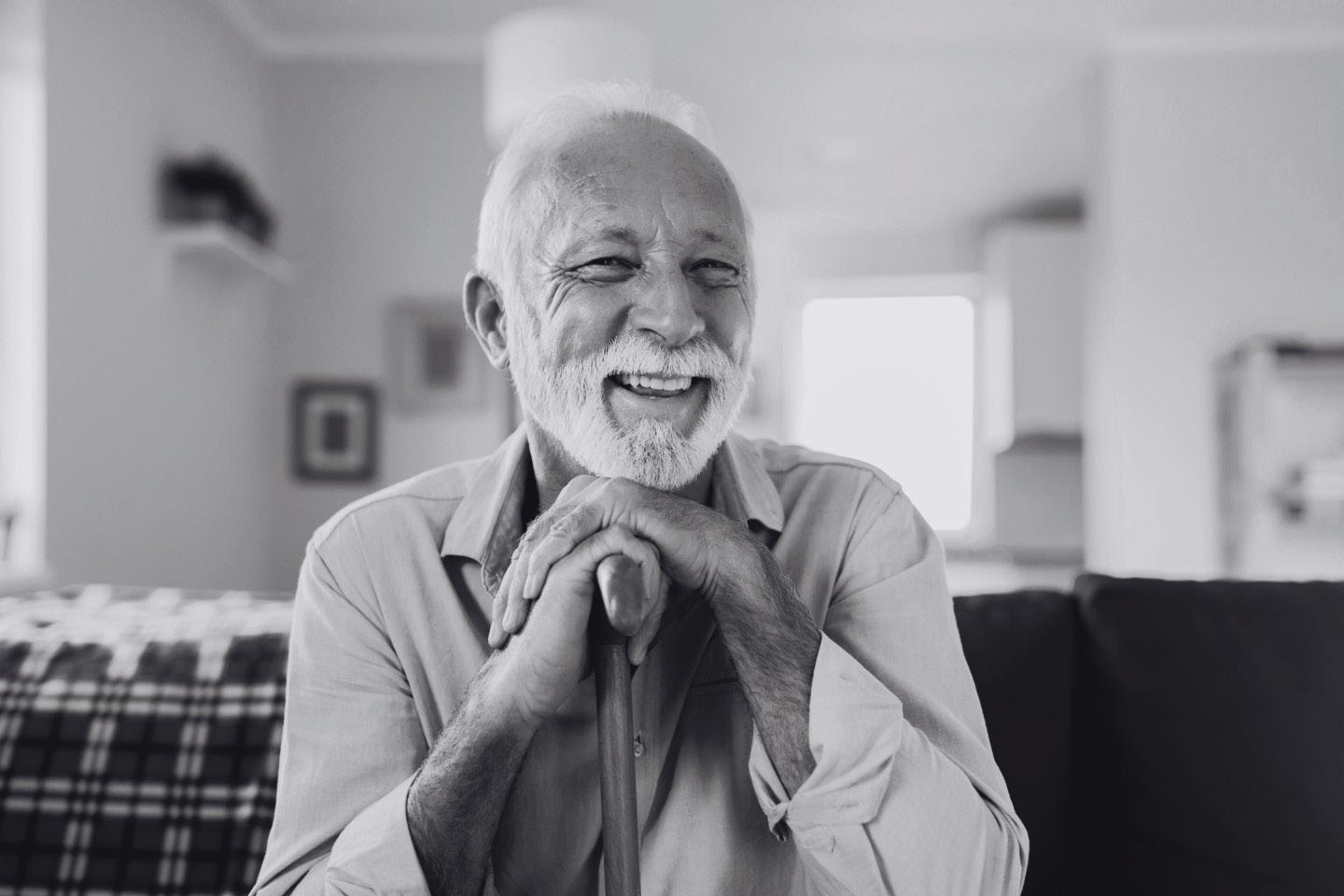








26 CMM July 2024 DSCR APPROVED Contact us for a free demo: leecare.co.uk
Transform Health & Social Care Managment with Platinum6
WANT TO TRY? Call 0800 086 2462 Find out more www.c-t.co.uk S TAY SAFE WITH SMART WIRELESS NURSE CALL Safer, more efficient care
It was also a response to the many ways that society is letting down both the older population of today and tomorrow by failing to adequately prepare for significant demographic change and facilitate the changes needed to make this country a better place to grow old.
Widespread support
Since our launch, the campaign has grown and grown. More than 80 organisations, including the Homecare Association, Care England and the GMB union, quickly backed our call. The public has also spoken on this issue, and it is clear there is a lot of support for a Commissioner for Older People and Ageing in England.
"More than two million people of state pension age are currently living in relative poverty in the UK."
To mark the anniversary of our campaign launch, we took our calls to the heart of Westminster by delivering a petition of more than 36,000 signatures to the doors of 10 Downing Street as well as delivering it to Labour and Liberal Democrat representatives.
To support the petition hand-in, the campaign revealed new polling of more than 1,100 people aged over 65 in England which found that three in four (75%) do not believe that society understands the issues facing older people.
A commissioner could champion the rights of older people, which can be easily forgotten and overlooked. As we saw during the COVID-19 pandemic, this can have devastating consequences. The Government’s policy to discharge care home residents from hospitals without testing led to thousands of unnecessary deaths with the High Court eventually ruling it to be ‘unlawful’.
A valuable asset
There needs to be an independent voice to speak up and protect the rights of older people, particularly in times of crisis. Aside from being an important voice protecting the rights of older people during crises, a Commissioner for Older People and Ageing could also work with employers, civil services and other relevant sectors to challenge discrimination and improve practices.
We need a commissioner to act as an independent champion for older people and ensure
that policymaking across Government considers the long-term needs of our ageing population.
There are 11 million people aged 65 or over in England. In 10 years, this will grow to more than 13 million and there is currently little connected thinking in Government about how we can ‘age better’ in the context of an ageing population.
A commissioner would be a valuable asset to the Government in identifying the challenges and opportunities of an ageing population and bringing an independent, non-partisan approach to finding solutions. They could champion reforms like pension scheme auto-enrolment, which transformed the preparedness of all ages for retirement. There are many crucial long-term reforms that are needed.
Growing ageing inequalities
A commissioner would also help address growing ageing inequalities. Already, many older people are marginalised in the labour market, or dealing with poverty, ill health and ageism.
More than two million people of state pension age are currently living in relative poverty in the UK and people in the poorest areas can expect to live with a disabling condition for up to 18 years longer than those in the wealthiest areas.
These issues have consequences for our economy, our national productivity, and they further entrench inequalities as we age. Unless progress is made, these numbers will only get worse. With the right resources, a Commissioner for Older People and Ageing would look at these inequalities and work with Government and other organisations to identify preventative solutions that help everyone enjoy a better ageing experience.
With older people making up a larger proportion of the population than ever before, we must start to address some of the deep-rooted and harmful ageist stereotypes that exist in society. As our Ageism: What’s the Harm? report details, ageism has adverse effects on the mental and physical health, employment outcomes and financial wellbeing of individuals.
A Commissioner for Older People and Ageing could play a transformational role, challenging the age discrimination that half of adults aged over 50 in England experienced in the last year.
Challenging societal norms
Ageism negatively impacts mental health in a number of ways, including how negative portrayals of older people can lead to poor body image or increased anxiety about getting older and being patronised and infantilised by people, such as healthcare professionals.
It can also negatively impact mental health
>
CMM July 2024 27 THE CAMPAIGN TO GIVE OLDER PEOPLE A VOICE: SUPPORT IS GROWING
>
through the stress of negative experiences in the workplace, such as being overlooked for promotion, feeling forced into retirement or the loneliness caused by living in communities that are not age-friendly.
Ageism affects an individual’s physical health too, through receiving care and treatment that is based on age rather than an objective assessment of health needs, engaging in unhealthy behaviours because of a negative outlook on the prospects of ageing or living in a home that is not safe or doesn’t meet your needs as you age.
To counter prejudice towards older people, we need it to become a societal norm that negative stereotypes are challenged and positive attitudes towards ageing and the contribution that older people make to society are promoted.
A Commissioner for Older People and Ageing in England could work to shift attitudes, empowering older people and driving more positive outcomes. This would unlock opportunities for older people and benefit the whole of society.
Ageing is something that everyone experiences and improving the experience will benefit all of us. Everyone deserves equal opportunity to live healthier, dignified and more financially secure later lives.
A Commissioner for Older People already exists in Wales and Northern Ireland and they have lead campaigns on cross-cutting issues that affect older people from all walks of life, from bus passes and care during COVID-19 to the uptake of social security entitlements.
A just cause
When we launched this campaign last year, we knew there was a compelling case to create a Commissioner for Older People and Ageing in England. Events since then have only served to highlight the necessity and urgency for change. Our anti-ageism campaign, Age Without Limits which launched in January, has brought further attention to the overwhelming presence of ageism within our society.
Amongst a raft of findings detailing the scale and nature of ageism in England, the campaign has revealed that more than half (53%) of people aged 50 and above believe the depiction of older people in the media is negative, stereotypical and does not reflect their lives.
The finance chapter of our State of Ageing 2023/24 report, which was published in March,
highlighted the dire financial insecurity and inequality among older people. The report detailed how large proportions of people aged 70 and above, who are in serious financial difficulties, have cut back on the essentials of life.
Older people are eating less than they should, avoiding going to the dentist and reducing the number of showers or baths they have. This situation seems set to deteriorate over the coming years following the Spring Budget, which the Resolution Foundation calculated would increase a pensioner’s tax bill by an average of £1,000 by 2027/28 because of frozen income tax thresholds.
In addition to this, our new Safe Homes Now campaign revealed the reality for millions of older people who are living in homes that pose a direct threat to their health. For the first time since 2016, the number of non-decent owner occupied homes has risen, with 2.2 million homes now defined as unsafe. If we want this country to become the best place in the world to grow older, we need to protect the rights of older people and better consider our ageing population in the policies we set and the society we build. That work needs to start with the creation of a Commissioner for Older People and Ageing.
Calling all care providers
While the Centre for Ageing Better is calling on Government to put older people at the heart of policy planning, there is also an opportunity for care organisations to look more closely at their own practices.
This means not only in the way that they care and support older people but the way that they recruit and retain older workers, particularly in the face of skills shortages and unfilled vacancies in the care sector.
There are around 350 signatories to our Age-friendly Employer Pledge, a nationwide free programme for employers that recognise the importance and value of older workers and who are committed to improving work for people in their 50s and 60s.
Pledged employers already include more than 60 businesses from the health and social care sector including Anchor Hanover Group, Practice Plus Group, Essex Cares Ltd, CareTech Community Services and Cygnet Health Care.
For more information on the Age-friendly Employer Pledge, visit https://ageing-better.org.uk/ age-friendly-employer-pledge. CMM
Dr Carole Easton OBE is Chief Executive at the Centre for Ageing Better. : @Ageing_Better
Email: info@ageing-better.org.uk

Do you think that a Commissioner for Older People and Ageing in England would be beneficial? Visit www.caremanagementmatters.co.uk and leave a comment on this article or join the conversation to share your thoughts.
28 CMM July 2024 THE CAMPAIGN TO GIVE OLDER PEOPLE A VOICE: SUPPORT IS GROWING
>
•
•
•
•







CMM July 2024 29 SECURE YOUR PLACE NOW In association with @CMM_Magazine #CMMInsight www.caremanagementmatters.co.uk A series of lunchtime webinars FREE to attend Record, monitor and report care – all in one powerful platform Used by 235,000 care workers daily supporting 385,000 people
Secure and accurate notes
Personalise care for everyone you support
•
•
Save time on admin and collaborate more effectively
Join up and connect all your technology
Analyse and report data in an instant
24/7 support whenever you need us To book a free personalised demo, please contact us on 023 8000 2288 or email hello@nourishcare.com nourishcare.com

INTO PERSPECTIVE
How can autistic people and people with learning disabilities be empowered to vote?
In this issue, Into Perspective invites two founding organisations of My Vote, My Voice to discuss the campaign, its aims ahead of the general election and the barriers autistic people and people with a learning disability face when trying to cast their vote.
Whilst people with learning disabilities and autistic people can participate in elections and politics, there are many barriers that they face when they try to accomplish this. The My Vote, My Voice campaign was established to remove these barriers so that everyone can participate in UK politics.
According to the Electoral Commission, some of the barriers facing people with learning disabilities and autistic people include not having accessible information about
political parties or the process of casting their vote, the polling station building not being accessible, lack of information about being accompanied by a carer and lack of polling station staff training, amongst others. With this array of barriers in place, it is not surprising to hear that people with a learning disability and autistic people struggle to find a place for themselves in politics.
A mother and carer to a young lady with learning disabilities and autism in Leicestershire shared her experience of going to the polling station during the local elections held across the UK on 2nd May 2024. In a local press article, Tess Rushin discusses how she felt it was important for her daughter to feel informed and comfortable when voting, and most importantly that her vote mattered. To help her daughter, Ms Rushin gave her daughter information about the candidates in terms she would understand and began talking about the process months before voting day. When at the polling station they were offered a wider booth separate to the main queue which meant they didn’t feel rushed. However, whilst this pair
had a great experience casting their votes, this experience doesn’t seem to be shared with many other people with learning disabilities or autistic people.
In 2014, Mencap carried out a survey amongst UK voters with learning disabilities. 17% of respondents said they were turned away from their local polling station due to their disability, whilst 60% of respondents said that simply registering to vote was too hard1. In a more recent survey in 2021 carried out by United Response, out of the 2,100 respondents 36 said they were turned away from the polling station due to their disability. These two sets of figures suggest that the current system lacks adequate support to empower all people with learning disabilities and autistic people to cast their vote.
Despite Government efforts to help include disabled voters, such as the points on voting in the Equality Act 2010 and the Elections Act 2022, people with a learning disability and autistic people are still having difficulties finding information about candidates in accessible formats, registering to vote and even casting their vote. The My Vote, My Voice campaign wants this to all change, enabling people with learning disabilities and autistic people to feel empowered to vote.
My Vote, My Voice has shared nine ideas to make getting involved in UK politics easier for people with learning disabilities and autistic people. From automatically enrolling everyone of voting age on the electoral register to providing easy-read versions of political manifestos, the campaign stresses the importance of being an informed voter ahead of the 2024 general election and in the future. It has also suggested ways in which the process can be changed to erase the barriers stopping or holding back people with learning disabilities and autistic people from casting their votes.
References
1Brown, Jennifer (2023) Disabled people: political participation. London: House of Commons Library. Available at: https:// researchbriefings.files.parliament.uk/ documents/CBP-9718/CBP-9718.pdf
30 CMM July 2024
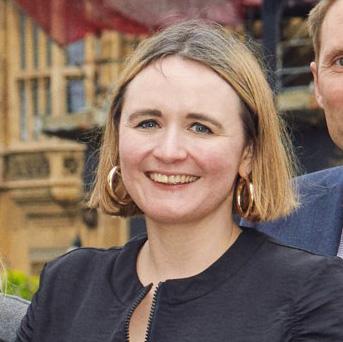
Access to information is key
Ali Gunn, Head of Public Affairs and Policy, United Response
Email: ali.gunn@unitedresponse.org.uk

@ali__gunn
To empower anyone to vote, you must first identify the barriers that could be preventing them. United Response has been advocating for accessible voting since 2014 and in that time, people with lived experience have promoted a shared call for better access to stop people being excluded, not just from casting their vote but politics generally.
Problems with physical access to polling stations, impact of voter ID and lack of information in accessible formats highlight systematic issues preventing people with disabilities exercising their democratic right to vote.
"...less than 2% of current MPs are open about their disabilities."
Access to information is key and we do not want to see history repeat itself, where easy read manifestos have been overlooked and published too late. This is why the My Vote, My Voice campaign is calling for all the political
parties to commit to publishing an easy read version of their party manifestos.
To address the issue of voter turnout, we must also acknowledge that lack of representation is part of the issue. According to the Disability Policy Foundation, just over 16% of elected councillors identify as disabled and less than 2% of current MPs are open about their disabilities.
The campaign is a non-partisan initiative led by United Response, Dimensions and Mencap. It has the support of over 100 organisations, 20 councils and over 15 parliamentarians who have signed the Charter to make accessible voting a reality.
For any families or providers of care who want to find out more, the My Vote, My Voice campaign website has easy read resources on useful topics like voter ID and political parties and offers practical support through voter workshops.
Let’s not assume people are not interested or capable of getting involved in politics – after all anyone who draws on social care is deeply impacted by political decisions. Ask, engage and share easy read resources.

Disabled people are underrepresented in Parliament
Dr Mark Brookes MBE, Advocacy Lead, Dimensions

Email: mark.brookes@dimension-uk.org @MarkBrookes66
I’ve worked in politics for a long time now and I would say it is so important to vote because you have a say on things that matter. I think that disabled people and people with learning disabilities like me deserve to be able to vote with dignity. I also think that disabled people in general are under-represented in Parliament.
"MPs need to hold accessible hustings and provide easy read information."
Having voted myself for the last 20 years, the idea that every adult should be able to exercise their basic democratic right seems a very simple one. However, for many people with learning disabilities and autism, it is not always that easy.
That is why I have been visiting different organisations, speaking with the Electoral commission and even handing in a petition to Downing Street, to promote the voices of autistic people and people with


learning disabilities and explain how voting can be made more accessible.
I once considered standing for election myself, at a local level, but the paperwork involved was far too hard. There was so much of it and there was also no way for me to ask for help to make it more accessible.
This lack of accessibility highlights the problem with the current system. I’ve met people who have felt left out of politics, who didn’t know they could vote. MPs need to hold accessible hustings and provide easy read information, including party manifestos, as standard.
Ultimately, we need more autistic people and people with learning disabilities to be supported to stand for Parliament, not only so we can have a say in the policies that affect us, but also so we can see ourselves being represented.
As I remind myself of the importance of exercising my right to vote, I want to take this opportunity to remind others that their voices are powerful, and support is in place to help them be heard.
CMM July 2024 31
Leeds Kirklees Derbyshire No inghamshire Warwickshire Worcestershire Cambridgeshire Norfolk Suffolk Hertfordshire Essex Buckinghamshire Northamptonshire Southend-on-Sea Bromley Kent Surrey East Sussex Brighton and Hove Bournemouth Christchurch Isle of Wight Poole Dorset Wiltshire Somerset Lincolnshire Blackpool Shropshire Berkshire North Yorkshire Gloucestershire Bedfordshire Luton Stoke-on-Trent Staffordshire Leicester Lancashire Blackburn Darwen Birmingham Cheshire East Oxfordshire Peterborough Bedford Leicestershire Rutland Hampshire Southampton Portsmouth The leading publisher of local authority care and support information Visit our website or call us on 01223 207770 to discuss how you can advertise your business to people looking for care and support in your area. www.carechoices.co.uk
THE CARER’S LEAVE ACT 2023:

Creating a more supportive workplace
The Carer’s Leave Act 2023 (‘the Act’) has been introduced to relieve pressure on people providing unpaid care on top of working in paid employment. Robyn Ackerman, a Solicitor in Employment and Corporate Law at Gordons Partnership Solicitors, provides essential guidance for care sector employers getting to grips with the new legislation.
32 CMM July 2024

Carers UK has been advocating for leave for carers for some time. The charity has reported that ‘Millions of people in the UK juggle their unpaid caring responsibilities with paid employment. Balancing work and care can be a real struggle –with many carers saying they are tired, stressed and struggling to manage their own physical and mental health.’
Carers UK has also highlighted that its campaign to introduce this legislation has been motivated by the hundreds of thousands of people who have had to leave the labour market due to the pressure of having to manage paid work alongside unpaid care. According to the charity, on average, 600 people leave work to care every day.
Greater workplace support and flexibility
Following the Carers UK campaign, the Act came into force on 6th April 2024 and introduces a new statutory right to all employees in England, Wales and Scotland to take up to one week’s unpaid leave from work per year to provide or arrange care for a dependant with a long-term care need. Prior to the Act, employees were required to use other leave such as parental leave, annual leave and flexible working for this purpose.
The charity has outlined how it will continue to campaign for greater workplace support and flexibility for carers. Ultimately, Carers UK hopes to secure up to 10 days of paid leave at minimum from work for all carers in employment.
In order to ensure compliance with the Act, employers should be aware of the following considerations.
When does Carer’s Leave apply?
There is no minimum length of service required for the employee to reach before becoming eligible for Carer’s Leave. The right to Carer’s Leave applies from an employee’s first day of work. The days can be taken as either full or half days and can be taken in the same week or over a 12-month period.
What does Carer’s Leave cover?
The law does not place limits on how the time must be used and it is intended to be wide-ranging to cover all potential aspects of the dependant's care. This could include making and taking the dependant to appointments or providing general daily support through to moving the dependant into or out of a care home.
Meaning of ‘dependant’ and ‘long-term care need’
A person is a ‘dependant’ for the purposes of the Act if, in relation to the relevant employee, they are a:
• Spouse.
• Civil partner.
• Partner.
• Child.
• Parent.
• Live in the same household as the employee (but not tenants, lodgers or employees) or reasonably rely on the employee to provide or arrange care (such as a neighbour).
> CMM July 2024 33
The informative publication is focused on cost-saving solutions and is essential reading for operational leaders and purchase decision-makers in the social care sector.
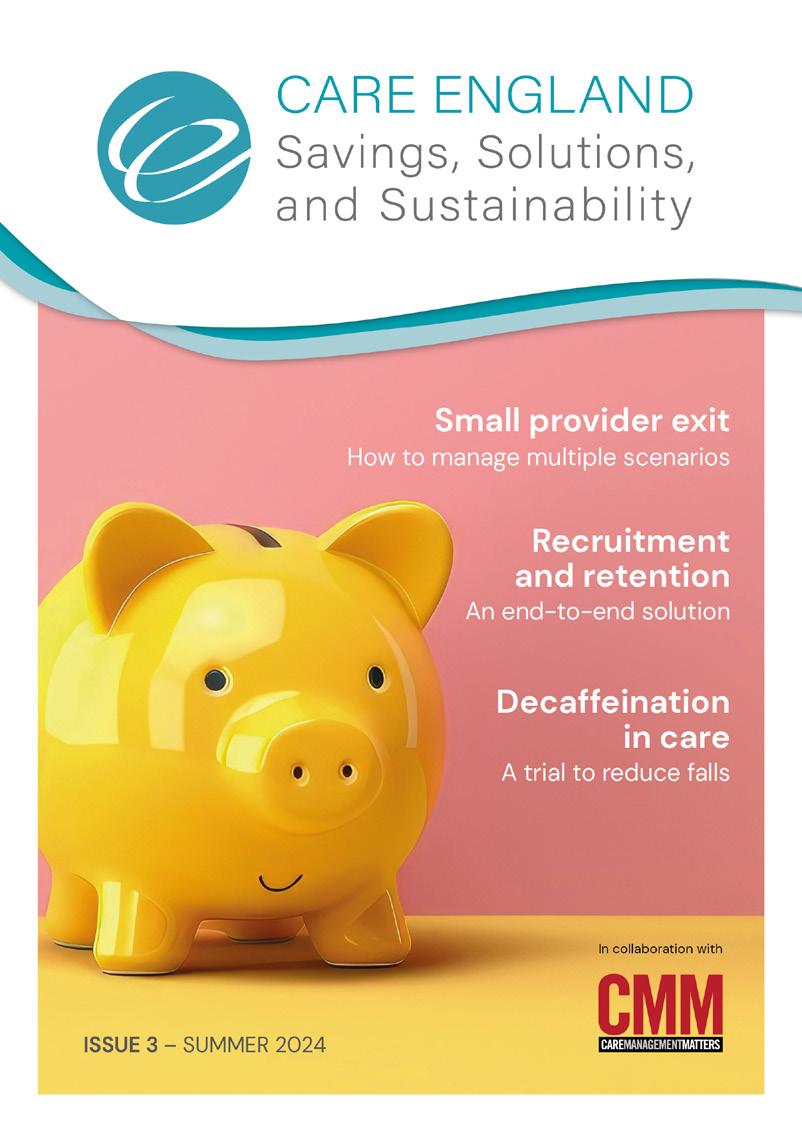
Click here for more information, and to read/download the latest issue

In collaboration with @cmm_magazine @CareEngland www.caremanagementmatters.co.uk www.careengland.org.uk ISSUE 3 is out now!
A dependant has a ‘long-term care need’ if any of the following apply:
• A physical or mental illness or injury that means they are expected to need care for a period of more than three months.
• A disability (as defined in the Equality Act 2010).
• Care needs as a result of older age.
How Carer’s Leave is calculated
Under the new legislation, an employee can take up to one week of Carer’s Leave every 12 months. A week means the length of time an employee usually works in a week. For example, if an employee usually works four days a week, they can take up to four days as Carer’s Leave.
For employees with irregular working patterns, you, as an employer, can work out how much Carer's Leave the employee is entitled to by adding up the total number of hours worked in the previous 12 months and dividing it by 52 (or however many weeks since the employee started the job, if they’ve been in the job less than a year).
The amount of leave is limited to one week per annum for each employee. The entitlement to leave does not increase if an employee cares for more than one dependant.
Can I refuse a request for Carer's Leave?
You, as an employer, cannot refuse a request for Carer's Leave altogether but can postpone it if taking leave at the requested time would cause serious disruption to the organisation.
If, as an employer, you need to postpone an employee’s Carer's Leave, you must:
• Agree another date within one month of the requested date for the leave.
• Put the reason for the delay and new date in writing to the employee within seven days of the original request, and before the requested start date of the leave.
Pay
You do not have to pay an employee for Carer's Leave, but you can choose to if you wish. This may be covered in employees' employment contracts or company policies, such as a Carer's Leave policy.
If, as an employer, you do offer paid leave, but it totals less than five days, employees are still entitled to take up to a week’s Carer’s Leave per year if they are supporting someone with a long-term care need. For example, if, as an employer, you offer three days of paid leave, an employee could take an additional two days unpaid as Carer’s Leave.
In addition, if, as an employer, you already offer a week or more of Carer’s Leave in your contracts for new employees (that covers planned and foreseen caring commitments), the new legislation will not impact this. However, some employers may decide to increase their leave provision following the introduction of the Act. For example, this could result in the allowance of an additional five days’ unpaid Carer’s Leave on top of what you, as an employer, already offer.
Notice
There is no set method prescribing how employees should request Carer's Leave. This can be written or verbal. However, an employee must provide advance notice to the employer of at least twice the number of days as the period of leave requested or three days in advance, whichever is earlier. Employees are not required to evidence their entitlement to the leave to their employer.
The Act has been introduced to support unpaid carers with planned and foreseen caring commitments. According to Carer’s UK, if the situation is urgent, employees have the legal right to take a reasonable amount of time off work to deal with an emergency involving someone who relies on them for help (as a dependant).
An employee’s rights and protections
As with other types of statutory leave, an employee will be protected from detriment and dismissal attributable to the fact that they took, or proposed to take, Carer's Leave. Employees have the right to return to the same job on the same terms following any period of leave.
Employer considerations
It is important that employers review their current policies and handbooks, to ensure they are offering Carer's Leave. Employers should ensure that their policies clearly state how and when the leave can be applied for, and clearly set out the procedure for doing so.
If an employee is dismissed for asserting their rights in relation to Carer's Leave, it may be automatically classified as unfair dismissal. If a claim is made in the Employment Tribunal, you, as an employer, should be aware that they will need to pay for fees, including legal fees, to defend the claim, and compensation if the claim is successful. It is therefore important that all staff members are made fully aware of the new legislation.
Benefits to the sector
Research from Carers UK suggests that care sector employers stand to benefit from numerous socio-economic outcomes following the introduction of the Act. Polling from the charity states that 37% of working carers said they needed unpaid Carer’s Leave, and a further one in seven said if they didn’t get it, they would have to reduce working hours or give up work altogether.
Moreover, of particular interest to the care sector, where cost-saving is of utmost importance and employee retention is much lower than many employers would like, one organisation participating in research from Carers UK estimated that it saved around £1.8m per annum through the application of carer policies. This decision to support its employees by providing additional flexibility prevented unplanned absences, presenteeism and escalating recruitment costs.
Lastly, employers who are in the position to offer paid Carer’s Leave to the employment-seeking market may find that this offer forms part of a more enticing recruitment package, something that can only be beneficial to a care sector facing ongoing workforce shortages. CMM
Do you think the new legislation goes far enough to support unpaid carers? Visit www.caremanagementmatters.co.uk and leave a comment on this article or join the conversation to share your thoughts.
CMM July 2024 35
Robyn Ackerman is a Solicitor in Employment and Corporate Law at Gordons Partnership Solicitors. Email: robyn@gordonsols.co.uk : www.linkedin.com/company/gordons-partnership
THE CARER’S LEAVE ACT 2023: CREATING A MORE SUPPORTIVE WORKPLACE >
Building a bet ter futu re for care 9-10 October 2024 NEC Birmingham BIRMINGHAM CARE SHOW Organised by: Join the conversation: #CareShowBHAM24 @CareShow @CareShows /Care-Show www.careshow.co.uk/cmm 9-10 October 2024 NEC Birmingham Celebrate care! The social care event of the year is back, bringing you new products, services, and inspiration to support you in improving the lives of those in your care and assist you in running your care business. Register now Scan to register your interest
TIME TO CHANGE? Engaging the next generation of care workers

Could younger people fill the gaps in the adult social care workforce?
Not as it stands, says Simon Bottery, Senior Fellow, Social Care at The King’s Fund, who shares findings from an ongoing programme of work looking at why they are under-represented and what to do about it.
The context
Social care has a problem with young people. It struggles to recruit and – particularly – retain them as workers. In the overall economy, under-25s make up 11% of the workforce and in some sectors it’s far more: around half of all waiters and waitresses are under 25. Yet in adult social care, only 8% of the workforce is under 25. Generation Z and social care are not, it seems, on the best of terms.
Why is this? Can anything be done about it? And – crucially – does the sector want to do it? These are the questions we set out to answer in recent research with social care providers (our further research with under-25s care workers themselves is just being completed and will be published this summer).
The answers are quite challenging for the social care sector, suggesting that there are
deep-rooted attitudes on both sides – sector providers and young people – that will need to change if we are to see significantly more younger people working in our care homes, home care and day centres. In addition, it may require concerted action by individual providers, local care bodies and national organisations if those changes are to happen.
The scope
For our research, we spoke with representatives of 11 social care providers from medium-sized and large companies (these types of organisations employ almost half of the adult social care workforce). The providers varied in the type of care provided, the settings in which they provided it, and the types of people who typically drew on their services. Where known, the proportion of 18-25s they employed ranged from 3% to 25%. >
CMM July 2024 37
We spoke with people in a range of senior leadership positions, including chief executives, human resources managers and recruitment managers about their experience of recruiting and retaining younger care workers, and about how the wider social care sector responds to younger workers.
Key findings
The respondents told us that younger staff had a great deal to offer social care, including – but not limited to – their energy, their core values and their familiarity with technology. One provider, for example, told us how a younger worker had used TikTok to explain a client’s care package to them, which had been really beneficial.
"...we have generally received an acknowledgement that the sector will need to change, and stereotypes will need to be addressed."
Providers also realised that age could sometimes be an important factor when matching the needs of people being supported to their care workers. One provider told us that one of its clients, a young man aged 21, went to a concert with care workers of a similar age to him and told them: ‘For the first time, I feel normal.’
But providers also told us that employing younger people has drawbacks. For example, they do need support, they may not be as ‘work ready’ as older workers and they may not fully understand what social care involves. As a result, we were told, many social care organisations were reluctant to employ them or – when they were employed – they were seen as short-term appointments who would likely leave their roles quite soon.
Additional responses
Some of our participants, while personally positive about young people working in social care, said they had experienced negativity in other parts of the sector or even within their own organisations.
One told us that managers in their organisation had said ‘oh, don’t give me anyone young’ because there were assumptions that they would not be able to cook or would be unreliable because ‘they’re going to be out clubbing and they might not turn up’. There was also sometimes resentment from the more experienced, older workforce about having to train new people in new skills.
Familiarity with technology, while an advantage, could also have its downsides, said some providers. We were told by one that it was ‘so, so difficult to get young people to leave their phones alone’ and even that social media has shortened the attention span of younger people.
Providers also told us that the main reason younger workers leave the sector after initially taking up roles is the inherent nature and challenges of social care jobs, for which younger people were not necessarily prepared. One provider told us that some people had left after the first couple of shadow shifts. ‘You can do training and you can show them useful things… but actually the reality can be quite shocking.’
Initial analysis
Many providers said they did try hard to tackle this, providing as much wraparound care as needed for all new starters, whether young or not. ‘If they’re 18, maybe had a bit of a Saturday job but nothing much more than that, then absolutely there needs to be a lot more handholding and support there’, said one.
Others worked hard to ensure that younger people were properly welcomed and had a chance to discuss career development. Some felt that the sector could do more to showcase the opportunities available to some young, rising stars – and it was noticeable that several of the senior managers we interviewed had themselves started off in the sector as care workers or ancillary workers.
But providers also thought that many young people already held negative attitudes about social care and were put off from entering it even before they started. We were told of preconceptions about social care including care homes that smelt of ‘cabbage soup’. ‘It’s just not seen as a glamorous or attractive line of work, is it?’ said one provider. Often it was felt that these attitudes started earlier, informed by negativity from parents,
teachers and careers advisers.
Respondents felt there was scope for providers to work together locally to promote the sector within schools and colleges. They also felt there was a strong case to be made for a national campaign to change attitudes towards social care and the opportunities that exist within it.
While we agreed with this, we also felt that the sector will need to address its own, sometimes stereotypical attitudes towards younger people. While some generational differences do exist – Gen Z is more socially progressive in some areas than previous generations, for example – these differences are more subtle than newspaper headlines would have us believe and do not necessarily affect young people’s capacity to work in social care. Nor do they apply to all younger people.
Gathering feedback
When we have presented our findings to providers, we have generally received an acknowledgement that the sector will need to change, and stereotypes will need to be addressed. However, we have also experienced some defensiveness.
Some have said that while attitudes towards young people can be negative, that is not true in their organisation or in their part of the sector. Others have said that young people may experience negativity in social care, but it is no worse than in other industries. Some have told us that the stereotypes – or some elements of them – are true.
Further research potential
We think there needs to be a wider discussion about these attitudes and issues. Our research with younger people in the social care workforce will be published later this summer and will reinforce the need for the sector to adapt itself more effectively to the needs of younger people if it wishes to recruit and retain more of them.
But with the international recruitment option for providers now apparently becoming more difficult, if the sector wants to fill its continuing high number vacancies, then looking to domestic workers, and under-represented groups like men and younger people in particular, may need to be part of the solution. CMM

38 CMM July 2024 TIME TO CHANGE? ENGAGING THE NEXT GENERATION OF CARE WORKERS
What is your experience of recruiting and retaining young people in your setting? Visit www.caremanagementmatters.co.uk and leave a comment on this article or join the conversation to share your thoughts.
is
Social Care at The King’s Fund. Email: s.bottery@kingsfund.org.uk : @blimeysimon >
Simon Bottery
Senior Fellow,


Education and training for the social care workforce
If you work in adult social care, Macmillan’s Social care community on the Learning Hub is the go-to place for free education and training on cancer care.
There are over 20 on-demand e-learning courses, bitesize resources and virtual classrooms to develop your knowledge and skills in supporting people affected by cancer.
This community is for all staff working in adult social care who want to improve their understanding of cancer and skills in supporting people affected by cancer. This includes staff working in residential care, nursing homes, home care, sheltered accommodation, assisted living and day centres.
In the community you’ll find the following topics:
• Cancer awareness
• Cancer and other conditions
• Communication skills
• Personalised care
• Palliative and end of life care
Scan the QR code to log in or register for an account, then search ‘Social care community’
 Macmillan Cancer Support, registered charity in England and Wales (261017), Scotland (SC039907) and the Isle of Man (604). Also operating in Northern Ireland.
Macmillan Cancer Support, registered charity in England and Wales (261017), Scotland (SC039907) and the Isle of Man (604). Also operating in Northern Ireland.
Whether you’re taking your first steps on your digital journey – or looking for the latest news, the Digital Care Hub can help. We provide free advice and support on data protection, cyber security and using technology. And we get you. We are run by social care providers, for social care providers.
www.digitalcarehub.co.uk
Data Security and Protection Toolkit – deadline 30 June
Is your DSPT up to date? If not, you can’t use it as evidence of your data protection arrangements. The deadline for 2023/24 is 30 June 2024. Get free assistance to complete and implement your DSPT from the official support programme –Better Security, Better Care.
www.digitalcarehub.co.uk/dspt
Free elearning for care staff
Use the free elearning course on data protection and cyber security specifically for social care staff.
www.digitalcarehub.co.uk/elearning
How would you cope if you lost data? How would you access information about people’s care needs, or staff rotas and payroll data? Make sure your business continuity plan is up to date. Use our free templates and tools to develop your plan.
www.digitalcarehub.co.uk/business-continuity
Don’t delay Get free support on data protection and cyber security
The next steps in digitising social care: Simplifying the journey

The latest episode of CMM OFF THE PAGE saw colleagues from the National Care Forum (NCF) and Person Centred Software (PCS) delve into digitisation in social care and what this means for providers and people drawing on care and support. Here, Liz Jones, Policy Director at the NCF, reflects on the podcast’s essential talking points.
CMM July 2024 41
>


10.5 THOUSAND Proud to have supported almost £5.9 MILLION IN GRANTS AND SUPPORT SUPPORT care workers with over Support us to help even more www.thecareworkerscharity.org.uk
>
Setting the scene
To me, it seemed important to begin by providing some background on the digital journey and what ‘digitising social care’ actually means. We set the scene and reflected on the pandemic, when there was a collective realisation that data was not available for adult social care because records were largely stored on paper. This created a major issue in demonstrating the number of people who were being supported and the prioritisation that was desperately needed in the sector.
"Funding will close in March 2025, which is the DHSC deadline for completion of the digitisation process."
This encouraged Government to support providers to begin transitioning from paper to digital social care records (DSCR). The DiSC programme was launched in 2021 and £150m of funding was made available for providers, on a £50m per year basis. The funding has now reached its final pot, so any providers who have not yet got a DSCR system should move quickly.
Funding will close in March 2025, which is the Department of Health and Social Care (DHSC) deadline for completion of the digitisation process. The DHSC’s target is for 80% of social care providers to be using a DSCR system and 80% of people being supported having an individual DSCR by this time.
Funding is provided as a contribution to year one costs, to cover software licensing, hardware and implementation, meaning providers must fund the remaining costs in the first year and full costs in subsequent years. It is crucial to understand that costs are ongoing and need to be factored into long-term budgets. Providers should talk to their local integrated care system’s (ICS’s) digital social care lead to find out more.
Here to stay
DSCR systems are here to stay and have become the foundation for lots of care providers’ digital journeys; the first building block, you could say, towards the sector’s full immersion into the digital world. Digital records can transform operations for providers. They offer a dashboard view of your workforce, the people you support and their changing needs, so your whole organisation can be kept aware of updates and all interactions with individuals receiving care.
Beyond what might be viewed as the ‘tasks’ associated with adult social care provision, what digitisation also creates is the opportunity to focus more on a person’s wellbeing and record a 360-degree view of how that person is feeling. It was important then, to get PCS’s perspective as a care management software provider whose products help providers gather more information about people and improve efficiencies, effectiveness and compliance in their care settings. We explained how DSCRs can help care managers and teams focus on outcomes for people. In the old world, information would have had to have been pulled from many different locations, but within the DSCR, everything is in one place. The data subsequently created can provide incredibly useful insights into the needs and requirements of people, as well as how the provider’s business is performing in delivering care outcomes.
Unprecedented impact
As many readers will know, the NCF is a founding member of Digital Social Care, now the Digital Care Hub. At that time, we were involved in a digital pathfinder project, called the Hubble Project, and one of our members who we talked to as part of the project had been operating DSCRs as well as an electronic medication system (eMAR) during the early stages of COVID-19, before testing was available.
Thanks to the way these systems recorded information about people, the provider was able to identify symptoms that older people suffering with COVID-19 presented with that were different to the symptoms known at that time. The provider was able to feed this vital information into the wider health and care system. which no doubt went on to have an enormous impact on our understanding of how COVID-19 presented amongst other people.
Minimising risk
What we all need to be aware of when it comes to any digital transformation, is cyber security and data protection and what we can do to minimise risk. We outlined our recommendations, starting with the Better Security, Better Care programme and the Data Security Protection Toolkit (DSPT), both developed for adult social care.
The DSPT uses a self-assessment approach to help providers assess their data security (both digital and paper) and there are a wide range of resources to support providers throughout the assessment. For smaller organisations who do not have either an internal IT team or access to outsourced support, it can be scary. The sector is frequently under increased attack from sophisticated hackers as we carry a lot of valuable data, so we need to protect our organisations better and be more aware of the risks. >
CMM July 2024 43 THE NEXT STEPS IN DIGITISING SOCIAL CARE: SIMPLIFYING THE JOURNEY
The art of the possible
So, what is the ‘art of the possible’ when it comes to the adoption of technology and integration within social care? What is already happening and what does the future look like? We talked about integration between software products, within social care and the NHS, and the importance of having good relationships with your assured supplier.
It is key to determine what an assured supplier is offering you – check out its credentials, particularly in cyber security, and how many of the 14 NHS DSCR Standards it complies with. Also, how does it manage data migration, does it understand your way of working and are mutual expectations understood?
You’ll also want to know if it has considered future developments around shared care records and increased interoperability with other platforms. The same question can be asked of your ICS to understand where it is on the roadmap. There is a list of NHS England-approved assured suppliers that social care providers can access here.
Scope for interoperability
GPConnect is a national programme that allows social care providers to review the GP records of the people they care for at the click of a button, creating time savings and efficiencies. Providers can easily find out if they would be able to integrate with this system by checking with their DSCR provider. As the conversation moved into interoperability, we talked about the digital version of medication management or eMAR, which was briefly mentioned earlier and can have a huge impact on reducing medication errors.
If a provider’s DSCR and eMAR talk to each other through one device or app, data about each person is also joined up. We explained how this would create many more prevention opportunities as the combined information creates a better ‘story’ of a person. Interoperability could help plot changes, to medication for example, along a timeline, explain why these changes have been made and indicate the evolving needs and requirements of the individual.
Advancements in falls technology were also explored and the possibilities presented by technology in not only monitoring falls, but also recording a care note once a fall has happened, all in real time. In the event of a fall, it is also possible to show how long it was before the person was attended to, which is vital information for ambulance staff if they are required.
With the DSCR acting as the foundation, all this additional information could act as an ‘ecosystem’ around a person, enabling providers to enhance their
care offering based on individual need. There is also the added ability of evidencing service improvements, which is important for ensuring compliance and reporting to the regulator.
Monitoring global trends
Ambient or sensor technology is an area where UK providers have fallen behind other nations. We talked about expanding our view of the art of the possible globally and this is something the NCF is exploring with more vigour via the Global Ageing Network. Ambient sensing is developing into laser detection of key wellbeing indicators, such as heart or breathing rate, and can be operated purely on a ‘plug and go’ basis.
"The CQC has communicated that it won't be awarding 'Good' or 'Outstanding' ratings to providers without a DSCR system."
The possibilities are endless, but how do providers make the most of these advancements and is there funding available? We explored one potential avenue that would see collective investment from the regulator, ICSs and providers, working together to invest in these types of technology. Speaking of the regulator, to any providers who feel that they could sit in the 20% without a DSCR by March 2025, a word of warning – the CQC has communicated that it won’t be awarding ‘Good’ or ‘Outstanding’ ratings to providers without a DSCR system.
Further support
For any providers left puzzled or concerned after listening to this episode, our advice is to talk to other local providers to learn about their progress towards digital. Equally, if you are a member of a regional trade association, or indeed a national membership body, like the NCF, reach out and visit providers with systems in place. This is the best way to know what system would suit your business. In addition, once it comes to implementation, involve members of your wider team to get their perspectives and input. Most importantly, be bold and brave. The NCF can help with support and signposting to information covering all aspects of digital transformation. Contact bev.futtit@nationalcareforum.org.uk CMM

What is your experience of digitisation and what benefits have you seen? Visit www.caremanagementmatter.co.uk and leave a comment on this article or join the conversation to share your thoughts. Liz
THE NEXT STEPS IN DIGITISING SOCIAL CARE: SIMPLIFYING THE JOURNEY 44 CMM July 2024
Jones is Policy
at the National Care Forum (NCF). Email: liz.jones@nationalcareforum.org.uk : @NCFCareForum
Director
>
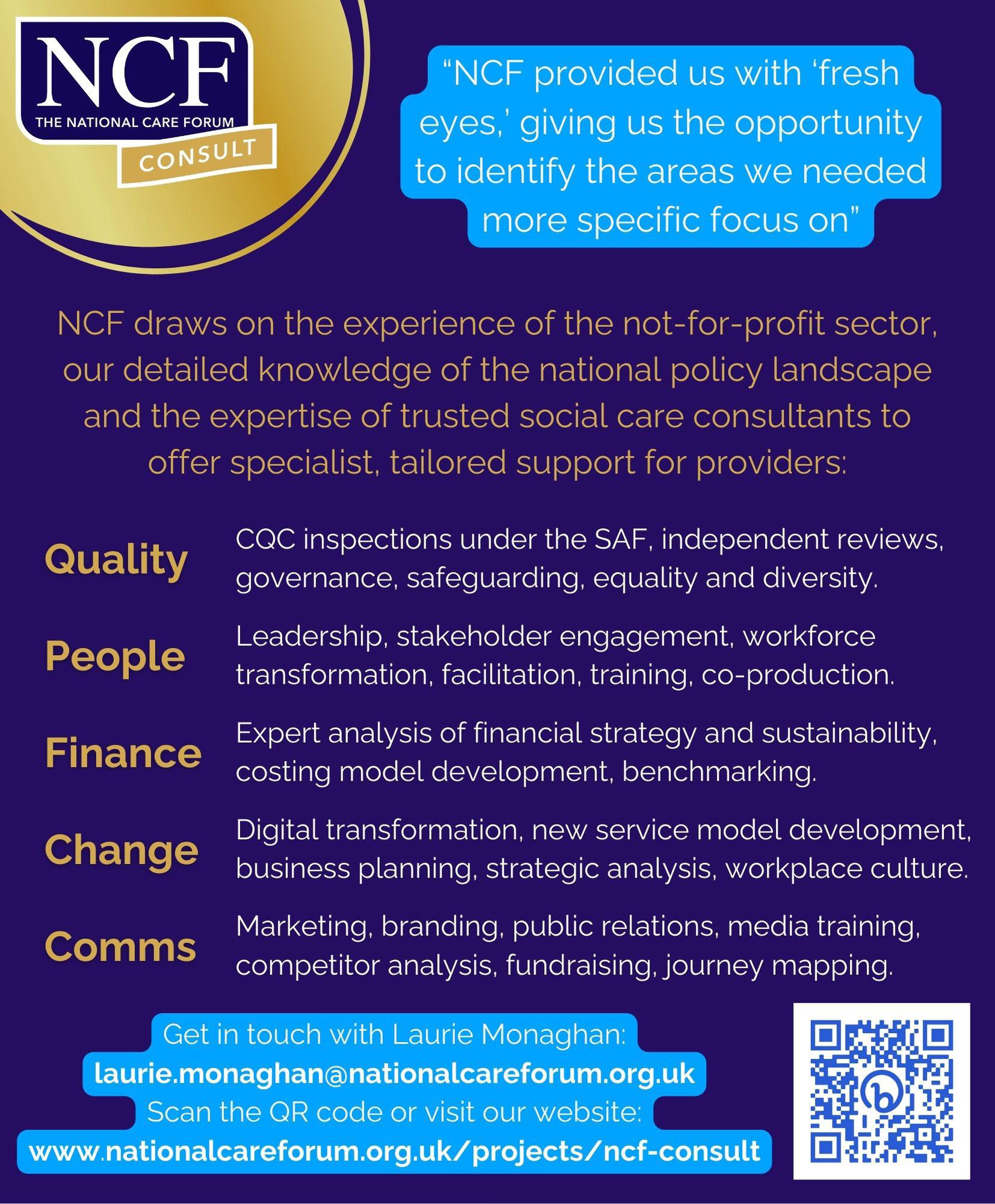
CELEBRATING EXCELLENCE IN COMPASSION
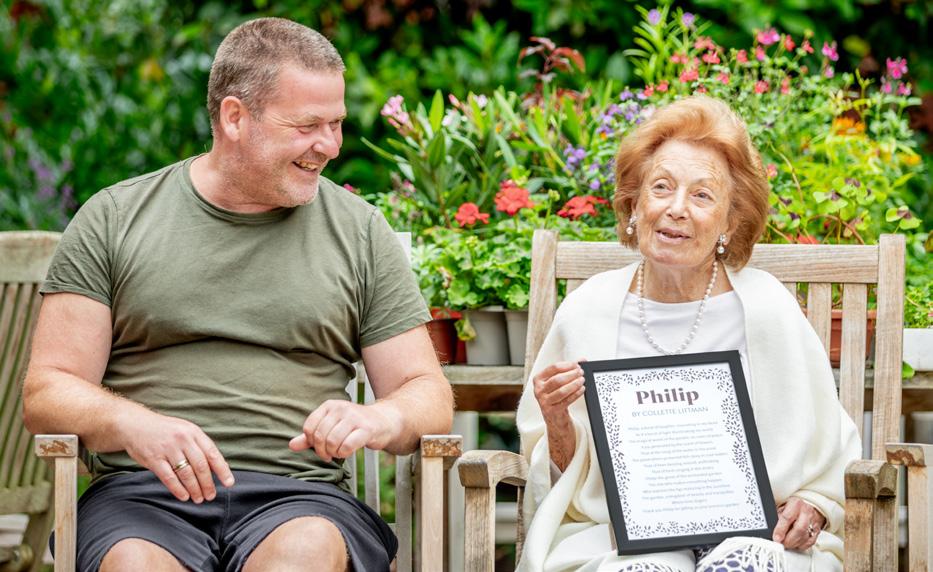
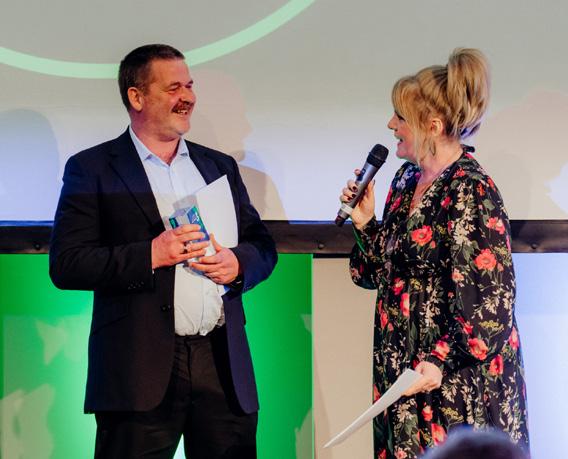
Philip White, Head Gardener at Nightingale House, won the Compassion Award at the 2024 Markel 3rd Sector Care Awards. In this edition, CMM hears from Nightingale Hammerson, who employ ‘Phil the Gardener’, about the therapeutic power of gardening.
Nightingale Hammerson has a long history of providing high-quality residential care in our homes, Nightingale House in Clapham and Hammerson House, Wohl Campus in Hampstead. The outstanding care provided enriches the quality of life for our residents, aged between 69 and 106.
At the core of this exceptional care lies the dedication of individuals such as Philip White, Head Gardener at Nightingale House, whose commitment recently earned him the Compassion Award at the 2024 Markel 3rd Sector Care Awards. Phil was recognised for his compassion which goes above and beyond the role he holds within the charity.
Accomplishment and purpose
Phil has been working at Nightingale Hammerson for 14 years. For the past six years, he has held the role of Head Gardener at Nightingale House, a home for older members of the Jewish community in Clapham, South-West London.
Phil has planted a plethora of fruit trees ranging from apples and pears to quince, which feed the bees and provide fruit for the home. Residents and children alike enjoy collecting and tasting the fruit. Phil is also proud of the
fishpond with its koi carp which provides a weekly feeding activity for the nursery school children. ‘The garden is a joy. I love planting new things and showing the residents and the children how to enjoy nature,’ Phil commented.
As Head Gardener at Nightingale House, Phil is responsible for developing the gardening therapy programme operating in both Nightingale Hammerson homes. He plays an integral role in enhancing residents’ lives. Gardening therapy sessions help reduce pain, lower stress levels, awaken the senses and enable residents to experience the joys of nature. Planting new blooms and harvesting fruit and vegetables are transferrable skills for other tasks our residents may struggle with.
Activities include digging and preparing the soil for flowers or trimming plants and shrubs. This helps to improve strength, flexibility and balance. Whether it is the daily watering of plants or allowing our residents to choose and grow their own fruit and vegetables, they experience a sense of accomplishment and purpose from these activities. Watching the fish in our ponds and collecting honey from our beehives brings them great joy. For those with dementia, gardening therapy gives them the opportunity to get outside in the fresh air and experience the joy of nature.

46 CMM July 2024 Markel 3rd Sector Care Awards
Connection to nature
Phil has been instrumental in organising intergenerational activities with residents and the children of the on-site nursery – Apples and Honey, Nightingale. Weekly gardening activities with Phil encourage an interest in gardening, appreciation of herbs and understanding of how to plant beautiful flowers. As part of a lockdown project for residents and children, Phil introduced bees to the beautiful gardens. ‘I wanted to ensure the children understood that honey comes from bees and not from Tesco,’ Phil commented.
Spinning of the honey occurs twice a year. Residents and children all take part in the activities; they spin the honey and pour it into jars. The pure honey is used for tastings, religious festivals and the remainder is sold to fund the project.
Sensory garden therapy is especially beneficial for those with sensory impairments. Through nurturing plants, residents engage in meaningful physical activity and experience a profound sense of purpose and connection to nature. The garden becomes a sanctuary where they can immerse themselves in smells, textures and sounds. Through the therapeutic act of gardening, residents often experience a reduction in stress levels, and a renewed zest for life.
A poem of gratitude and appreciation
For residents like Colette, who is visually impaired, Phil's gardening sessions are a lifeline. Colette is an avid traveller and used to spend many months travelling abroad. Through thoughtful recordings of the sea and waterfalls on his travels, Phil reminds Colette of the joy she used to experience from nature. They would talk about the recordings and reminisce over the wonderful experiences she enjoyed before she lost her sight. These recordings evoke memories but also serve as a source of comfort during challenging moments.
Last year Phil went to Fuerteventura on holiday. He was walking on the beach on a windy day with the waves crashing around him when Colette messaged to say she was missing him, and the garden was missing him too. He decided to record the sounds of the sea and the wind to share with her.
Before a recent medical procedure, Colette told Phil of her fear of the MRI machine, how the sounds were magnified for her and how her lack of sight made the whole experience more powerful and frightening. She decided to listen to his latest recording. Whilst laying there with the whirring of the machine around her and calmed by the sounds of the waves, Colette composed a poem of gratitude and appreciation to Phil for his commitment and dedication to the garden
and to the residents of Nightingale House.
‘I have never seen the Garden or Phil, the gardener, but as I say in my poem, the gardener is a burst of laughter that resonates in my heart. He brings the garden alive for me, so I can smell, hear and see it,’ Colette commented.
‘Philip’ By Colette Littman
Philip, a burst of laughter resonating in my heart.
As if a burst of light illuminating my world.
The magical world of the garden, an oasis of peace.
A joy generated by the scent of flowers.
That of the song of the water in the pond.
The pond where protected fish sleep in cool waters.
That of bees buzzing around, pollinating.
That of birds singing in the aviary.
Philip the genie of the enchanted garden.
The one who makes everything happen.
Who watches the figs maturing in the sunshine.
The garden, a kingdom of beauty and tranquillity.
Where time lingers.
Thank you Philip, for gifting us your precious garden.
Transformative power of compassion
When Phil collected his award, he spoke about the beautiful relationship he has developed with Colette. Through smell, touch and with his voice descriptions, Colette can still enjoy the beauty of the gardens. Nature has always been important to Colette and Phil helps keep the beauty of nature alive for her. ‘The smile that stretches across Colette’s face when I cut something fresh for her or give her fruit straight from the garden brightens my day,’ Phil commented.
In response to Phil’s award win, Chief Executive at Nightingale Hammerson, Jenny Pattinson, said, ‘Phil's recognition is a testament to the transformative power of compassionate care. The difference Phil makes to the lives of residents is incredible and goes well above and beyond his role looking after our beautiful gardens.’
Gardening therapy is invaluable for all residents, whether they have dementia, are visually impaired or experiencing feelings of loneliness. Nature’s ability to tackle loneliness and feel joy is priceless. The heart-warming story of Phil and Colette reminds us of the transformative power of compassion and the healing power of nature. CMM
Amanda Weinberg is a published author. She also works in the fundraising and marketing department at Nightingale Hammerson. : @NGHHammerson

Email: amandaw@nightingalehammerson.org
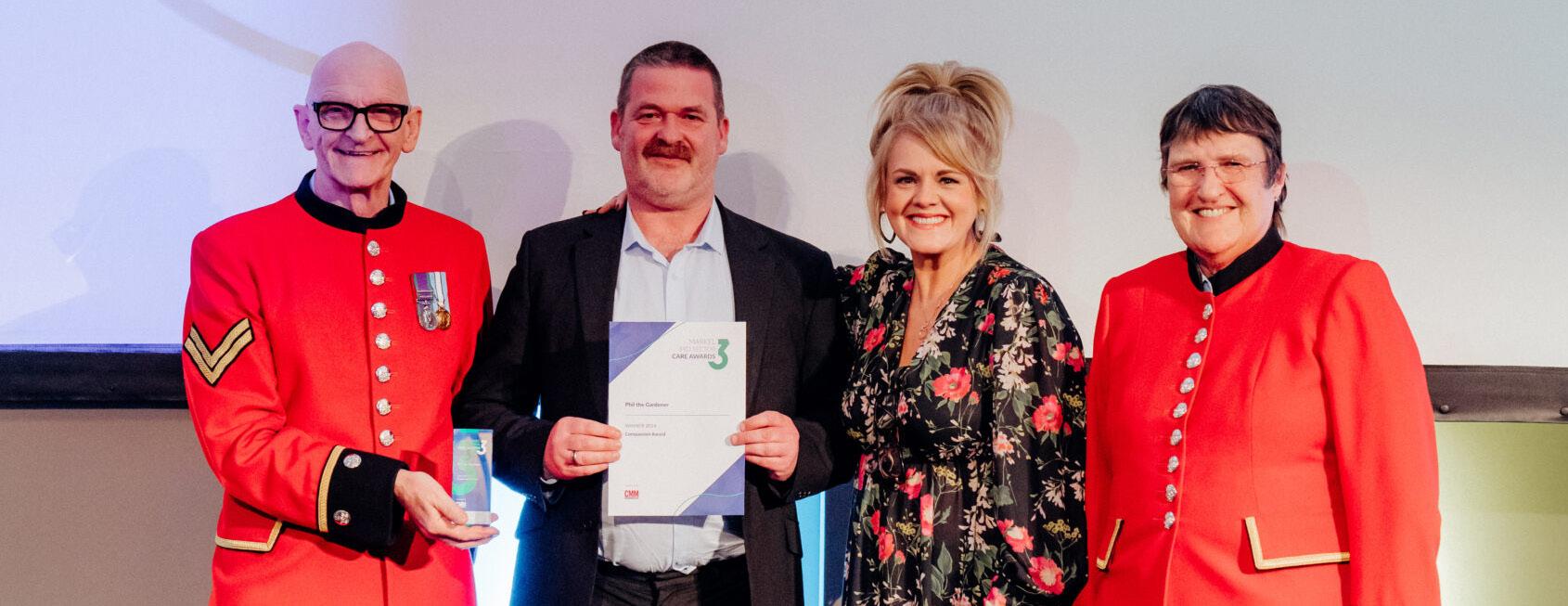

Headline sponsor

CMM July 2024 47
CREATIVITY IN CARE: A DAY OF INSPIRATION AND IMAGINATION WITH ARC ENGLAND
14th May 2024
ARC England members recently came together with the wider learning disability community to celebrate creativity in learning disability and autism support services.
The ‘Unconference’ event was designed to be informal and inclusive, and attendees were guided through sessions exploring the creativity happening in the sector every day. The feedback ARC England has received since the event has been very positive:
‘Thank you to the team for organising and delivering an excellent event – it was dynamic and very engaging. The content was excellent and the pace exactly right. Challenging and enjoyable in equal measure.’ David Sargent, Chief Executive Officer at ARC member Real Life Options and Chair of ARC’s Board of Trustees.
‘Congratulations on such a fabulous day on Tuesday. We loved it and there has been a real buzz since. We have come away feeling inspired to do more of what we’re doing and have lots of new ideas too! A dance session is high on the list!’ Katie Peacock, Exclusively Inclusive.
The day started with Clive Parry, ARC England Director, and sponsor, Christoph Marr from Marr Procurement, welcoming everyone. Clive explained the decision to choose creativity as the theme because it is an aspect of learning disability support that is both crucial and sometimes under-appreciated.
Another world is possible
Dr Clenton Farquarson CBE, Chair of the Think Local Act Personal Board, kicked off the day with his ‘Another world is possible’ session that introduced attendees to the concept
of Umbutu, a South African philosophy that means ‘I am because we are.’ It applies to care in the big and small ways that we relate to each other. Clenton spoke about how we can stop framing social care as a series of services and refocus on people’s relationships and dreams.
Putting the ‘Me’ in social media
Autism advocate, illustrator and Dimensions Social Media Officer, Michelle Rebello, shared tips on how to get your social media message across, with authentic content from people with lived experience. Michelle then invited everyone to draw their own monster on the tablecloth and described how to use it to face our fears. This got everyone’s creativity going and sparked conversations around the tables.
DanceSyndrome performance and Inclusion in Action workshop
Next up, DanceSyndrome looked at inclusion through the lens of co-production, providing insight into the group’s methodologies and sharing a performance extract from its latest show, SENse. The group then led participants in a creative choreography session about co-production. Each table created its own sequence of movements in response to the words ‘Love, kindness, support and dreams.’ DanceSyndrome returned after lunch to lead an inclusive energising movement session to set attendees up for the afternoon.
Storytelling Workshop, EQUALD, University of Sheffield
Dr Liz Croot and her team from EQUALD and the University of Sheffield led an inventive


storytelling workshop looking at ways to provide support using Individual Service Funds. The team explained how this work feeds into its research and invited people to sign up.
Workshops
The afternoon continued with a choice of three workshops led by ARC England members. Henshaws led participants in a drama performance and shared what creating performances means to them. The organisation talked about how to make dramatic involvement affordable, available and accessible to everybody.
Zoe Gilmour, an arts engagement specialist from Age Exchange, part of Community Integrated Care (CIC), facilitated a Paralympics-inspired visual arts session. Participants with lived experience from CIC’s creativity clubs led attendees in exploring different arts techniques, drawing on the spirit of the Paralympics. The artworks produced in the session will be shared with athletes ahead of the next games.
David Barras, Chief Executive Officer at Positive Support For You, spoke about the NHS England-sponsored Small Supports programme, which aims to build support around what people want, not what’s available. David encouraged participants to think and work differently. CMM
EVENT REVIEW
48 CMM July 2024 For more information about the event, visit the ARC England website.


WHAT’S ON?
Event: Date/Location: Contact:
Event: Date/Location: Contact:
Event: Date/Location: Contact:
Event:
Date/Location: Contact:
Event:
Date/Location: Contact:
Event:
Date/Location: Contact:
Event:
Date/Location: Contact:
Event:
Date/Location: Contact:
CQC ‘Well Led’ Quality Statements – an analysis 2nd July 2024, Online www.careengland.org.uk/cqcwebinar
NCF Governance Forum 2nd July 2024, Online www.nationalcareforum.org.uk/events/ governance
What Next? 2024 ARCO Annual Conference 3rd-4th July 2024, London www.eventcreate.com/e/what-next-2024
‘Right Care, Right Person’ in practice: One year on 11th July 2024, Online www.local.gov.uk/events
Care England Forum 2024 16th-17th July 2024, Stratford-upon-Avon www.careengland.org.uk/events/care-englandforum-2024
Digital Health and Care Conference 17th July 2024, London www.kingsfund.org.uk/events/digital-health-andcare-conference
Valuing Social Care in Nursing Education 18th July 2024, Greater Manchester www.skillsforcare.org.uk/news-and-events
Delirium Prevention, Assessment and Effective Management 15th August 2024, Online https://www.socialcareconferences.co.uk/virtualonline-courses/delirium-prevention-assessmentand-effective-management
CMM EVENTS
Event: Date/Location: Contact:
CMM Insight Webinar 4th July 2024, Online 12:00noon - 13:30pm Lisa Werthmann, Director, 01223 207770 lisa.werthmann@carechoices.co.uk www.caremanagementmatters.co.uk/webinar/
Please mention CMM when booking your place. Sign up online to receive discounts to CMM events and for more information on our upcoming events in 2024.
www.caremanagementmatters.co.uk @CMM_Magazine #CMMInsight

CMM July 2024 49
H.W.Pickrell Ltd Gardiners Lane North, Crays Hill, Billericay, Essex, CM11 2XE Mobile: 07860 894 331 • Email: sales@hwpickrell.co.uk Telephone: (01268) 521033 www.hwpickrell.co.uk
STRAIGHT TALK
Helen Cook, Managing Director at Personal Care Specialists, leads a partnership calling for urgent reform to the homecare system against the backdrop of the upcoming general election.
Golden opportunity
As the UK approaches a general election, the sector stands at a critical crossroad. Prolonged Government neglect and underfunding, coupled with recent systemic failures and pressing issues, have brought us to this pivotal moment.
Alongside leaders from Alpha Care Services, A&A Homecare and AliMo Care, I, as Managing Director at Personal Care Specialists, am calling for urgent and comprehensive reforms to create a sustainable and equitable homecare system that ensures high-quality care for the most vulnerable.
Feeling the pinch
Financial pressures are a significant concern. Local authorities often delay payments, sometimes taking up to 60 days, which creates cash flow problems, especially for smaller agencies like ours. Chronic underfunding leaves local authorities struggling to support providers, pushing financial burdens onto agencies and making it tough to deliver high-quality care and pay staff on time.
Unfortunately, we have determined that minimal funding increases from local authorities are not matching rising wages, putting extra strain on finances and staff morale. Despite evidence against it, the practice of commissioning 15-minute calls persists, exacerbating the situation.
Recruitment poses another huge challenge. Low wages, high job demands, poor industry perception and the impacts of Brexit make attracting and retaining staff difficult. Financial discrepancies, where councils fail to match necessary wage increases, push many care agencies toward financial crises.
Welfare under the spotlight
An additional alarming issue is the exploitation of overseas workers. Local authorities often accept the lowest bids for care contracts, leading to compromised care quality. The reliance on migrant workers, coupled with recruitment challenges, subjects them to substandard working conditions, raising serious concerns about potential modern slavery within the sector.
Moreover, the Care Quality Commission (CQC) has been criticised for quickly granting licences to unproven care providers to sponsor workers from abroad without thorough checks. This leads to an oversaturated market, increased operational costs and some providers being forced to close.
Pull of the private sector
The financial and operational challenges threaten the survival of smaller providers, pushing them to either close or move towards the competitive private adult domiciliary homecare sector. This shift demands significant investment in brand awareness to compete with larger national providers.
With the lowering of financial thresholds for state support and chronic underfunding, there is a real risk of reducing community-focused homecare services. This impacts the quality and variety of care available, especially for those needing personalised care solutions. New CQC adult social care assessments impose significant strain on resource-limited local authorities and providers. More support is required to manage these new standards effectively.
Systemic vulnerabilities
Local councils are increasingly subcontracting

care to personal assistants (PAs) who are not regulated by the CQC. This practice leads to inconsistent care standards and increased safety risks, compromising care quality. Stringent regulatory scrutiny for all care providers, including subcontracted PAs, is essential.
These challenges and Government failings result in a lack of choice for people drawing on care and support and the potential for compromised care quality. In addition, the system’s complexity and difficulty in raising complaints about inferior care leave many feeling powerless. Lastly, a lack of visibility for smaller providers means numerous people are unaware of the full range of care and support options available to them.
A unified voice
As a collective, my colleagues and I advocate for reforms that ensure timely payments, better support for unpaid carers and a sustainable funding model that prioritises the wellbeing of people drawing on care and support over financial metrics. Preventing the collapse of the fragile system is more urgent than ever.
The upcoming general election is a crucial opportunity for policymakers to rethink and revamp how social care is funded and managed. Without significant changes in the immediate future, the sustainability of compassionate, dignified and person-centred care is at serious risk.
A collaborative approach to reform, engaging all stakeholders to rebuild a fair, equitable and capable social care system is needed. My colleagues and I hope that the election will spur the next Government to prioritise and implement these much-needed reforms.
50 CMM July 2024
What are your experiences of the issues described in this column? How would you address them? Visit www.caremanagementmatters.co.uk and leave a comment on this article or join the conversation to share your thoughts. Helen Cook is Managing Director at Personal Care Specialists. Email: enquiry@personalcare4u.co.uk : www.linkedin.com/in/cookhelen


SIGN UP FOR
FREE PROVIDERS
Yes, that’s right. Absolutely free.
Gain CPD points
Access extended features and additional content
Read latest news email alerts
Comment on features and debate on important subjects
Access archived editorial
Receive a digital edition of CMM (10 issues per year)

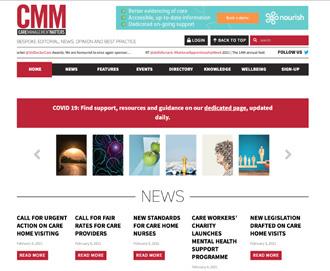













Sign up at www.caremanagementmatters.co.uk @CMM_Magazine
Designed by Evan Ho buhr




























 Amanda Partington-Todd, Deputy Director of
Amanda Partington-Todd, Deputy Director of













































































 Macmillan Cancer Support, registered charity in England and Wales (261017), Scotland (SC039907) and the Isle of Man (604). Also operating in Northern Ireland.
Macmillan Cancer Support, registered charity in England and Wales (261017), Scotland (SC039907) and the Isle of Man (604). Also operating in Northern Ireland.
























